#how to track keyword performance
Explore tagged Tumblr posts
Text
Effective Keyword Monitoring for Digital Marketing Success

In the swiftly evolving digital marketing landscape, maintaining relevance and visibility is crucial for sustained success. Among the myriad strategies available, keyword monitoring stands out as a potent method to fine-tune your online presence. By vigilantly tracking keywords pertinent to your industry, brand, or product, you can glean invaluable insights into consumer behavior, industry trends, and competitor strategies. This comprehensive guide delves into the significance of keyword monitoring and offers practical tips for implementing it effectively.
0 notes
Text
How to Use a Keyword Ranking Tool to Boost Traffic
Learn how to use a keyword ranking tool to grow your website traffic, improve SEO, and increase conversions. Easy tips and tools explained step by step. How to Use a Keyword Ranking Tool to Boost Traffic and Conversions Want to learn how to use a keyword ranking tool to get more visitors and sales? Keyword ranking tools let you see how well your website shows up in search results for specific…
#AIOSEO keyword tracker#boost conversions#competitor keyword analysis#content performance#how to use keyword ranking tools#improve SEO strategy#increase website traffic#keyword intent#keyword performance#keyword rank tracker#keyword ranking tool#related keywords#search engine rankings#SEO keyword tracking#track keyword rankings
0 notes
Text
Soft Launches and Soft Tyres
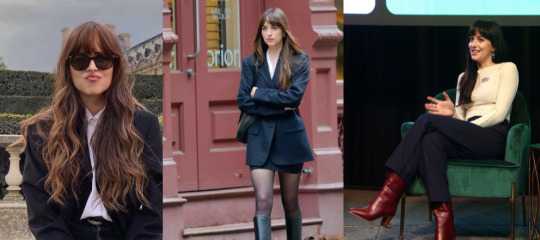
Part 1: The Princess of the Grid
A particular kind of silence falls in a garage before a race. It’s not quiet with radios crackling and the hum of tire warmers and mechanics shouting about torque and telemetry. But it’s a kind of silence in my head, like the calm just before I let the car swallow me whole.
I live for that silence. That, and the smell of burnt rubber. I’ve never fit into any neat little box anyway—not the way people expect, especially not when I got into F1 at 19. People expected me to be the new kid, quiet and compliant. And, well… okay, they were half right.
I was quiet. Still am, mostly. I don’t talk back, I let the track speak for me. That was something Seb used to say. “You don’t need to be loud to be heard, Moni.” He was my mentor before he became everyone’s eco-uncle and left us… left me. I still miss his hugs. And Daniel, god, Daniel was like my older brother, but funnier and worse at keeping secrets. He once said I had “golden retriever energy disguised in a kitten’s body.” Which is both cute and slightly concerning, but very him.
Anyway, it’s been five years now. I’m 24, and things have changed. There’s a new wave of younger drivers, some shinier, and I’m not the “baby” anymore. But I guess I still get called the “Princess of the Grid.” Mostly by Lando. Once, Carlos said it during a press conference, and Lando won’t let him live it down.
My mother raised me, just the two of us. She worked nights at a hospital and still managed to drive me to karting sessions on weekends. It wasn’t glamorous. We didn’t have the money that most kids in motorsport had. But I had her. She never yelled, never cried in front of me. Just kept going. Quiet strength. Maybe that’s where I get it from.
My dad left when I was six. I don’t remember much about him, and the stuff I remember feels more like watching someone else’s home video. He wasn’t cruel, just... unfinished. He didn’t know how to stay, and he missed a lot of things: my first race win, my Super Licence, and my debut in Formula One. Sometimes, people ask me if we’re in touch, and I say, “No, but I’m sure he knows where to find me.” I mean, it’s not like I’m hiding.
I signed my first F1 contract at nineteen with AlphaTauri, back when it was still AlphaTauri. It was a blur—media, pressure, more cameras in a week than I’d seen in my whole life. I kept my head down. Scored points when I could. Learned how to breathe in that car-shaped pressure cooker. I was never the loud headline, but I stayed consistent. That's what mattered. The paddock doesn’t always reward consistency, but it remembers it.
I still drive for VCARB even now, and I like it here. We’re not the underdog or the top dog. We’re the kind of team that sharpens you and makes you better.
-------------------------
Part 2: The Calm Before the Media Storm
Media day always smells like too much cologne and burnt coffee.
It’s a mix of waiting around in branded teamwear and pretending not to hear the questions asked in the next booth. My PR manager, Livia, clips a mic to my collar with practiced ease, gentleness usually reserved for bomb diffusers or hairstylists.
“You good?” she asks, smoothing the VCARB jacket over my shoulder.
“Define good,” I say, giving her a slight grin. She rolls her eyes.
“Smile. Be nice. Don’t swear.”
“Always nice. Almost never swear.”
“Almost being the keyword.”
She pats my arm and walks off, already on the phone.
The first few interviews are standard fare. Strategy questions, performance reviews, tyre talk — everything I’ve answered a hundred times, just repackaged in different accents and camera angles.
Interviewer: “Monica, do you think the team’s Q3 performance in Jeddah was a turning point?”
Me: “It was a data point. A good one. But one race doesn’t define a season.”
Interviewer: “You’ve been praised for your tyre management this season—”
Me: “I just don’t fight physics. That’s all.”
They laugh. One asks if I meditate. Another wants to know what I eat before a race.
“Toast,” I say. “Always toast.”
There’s a short break after the fourth interview. I peel off the mic and flop onto a couch in the VCARB media room. Isack’s already there, drinking a Red Bull while on his phone watching one of the videos the admin made us make on Instagram.
“You’re trending,” he says, not looking up.
I groan as I close my eyes to take the smallest nap a human is possible. “Again?”
He turns the screen toward me. A photo from last week, me again, blurry, exiting a hotel lobby at midnight. Someone had zoomed in on my hand touching someone else’s arm.
“Your mysterious shadow boyfriend strikes again,” he grins. “This time, people think it’s someone from the grid.”
“Great,” I mutter. “I love when my life makes headlines. You keep laughing, Isack, but one day, you won't even be able to pee in peace without getting on headlines."
He ignores me and keeps scrolling. “Also, apparently your ‘energy’ matched Pedro Pascal’s according to this fan edit.”
I blink. “What does that mean?”
“I have no idea. But I support it,” he says with a grin, and gets off the couch when his PR manager calls him for an interview.
I watch him walk away before my phone vibrates.
Groupchat: Who made this groupchat?
Carlos: MONICA.
Lando: Ma’am, why are YOU trending and not for overtaking someone???
Alex: Girl, you okay? Did you break the internet??
lewis: Princess, did I miss something, or did you go on a date with Pedro Pascal??
Charles: WHO IS THE MAN? Alex won't tell me anything.
Carlos: Becca won't either.
Max: I will find out. I know people.
Carlos: Moni. Seriously. Who is it?
Me: Stop spanning the group chat
Lando: We are not doing such thing, answer.
Oscar: We want to know?
Max: Does Daniel know? I bet he does.
Me:……
Charles: Young lady, come back here.
---
Sebastian (privately): 1 massage - unread
I stare at Seb’s message for a second too long. Then I press the side button and lock the phone without replying. The last interview of the day is with a lifestyle network—the ones who care more about what moisturizer I use than my racing line through Sector 3.
The questions start light.
“What’s always in your travel bag?” “How do you relax between races?” “If you weren’t an F1 driver, what would you be?”
I answer them all. (Sunscreen. Sleep. Veterinarian.)
And then
“So, Monica… the internet wants to know: Are you dating someone?”
There’s a beat of silence. Not awkward. Just quiet.
“I—uh.” I blink. “I don’t usually talk about my personal—”
“We know! That’s why everyone’s curious. There have been some pictures lately—late dinners, hotel lobbies. People are saying—”
I don’t hear the rest. My throat tightens. I nod slowly, a polite smile barely glued on. Livia appears out of nowhere, like a PR magician.
“I’m so sorry,” she cuts in. “We’re running late for a strategy debrief. Tight schedule today.”
The interviewer tried to hide their disappointment, but Livia was already guiding me out of the chair with a hand on my elbow and that fixed “this is fine” smile that PR people must practice in the mirror. Once we’re out of sight, she mutters, “You okay?”
“I’m fine,” I lie. In the hallway, I check my phone again. Seb’s message is still sitting there. Still unread.
-----------
Part 3: When the Internet Breaks
[Clip: ‘The Last of Us’ Season 2 – Press Junket | Interview With Pedro Pascal]
Pedro Pascal is seated comfortably and exudes his characteristic warmth and charm.
Interviewer: "Pedro, 'The Last of Us' season 2 episode 2….what an episode it was, it delves deep into love and loss themes. Has portraying Joel influenced your perspective on personal relationships?"
Pedro: "Absolutely. Joel's journey is one of profound connection and vulnerability. It's made me reflect on the importance of having someone who grounds you and brings light into your life amidst chaos, just like Ellie did for him in a daughter-father way."
Interviewer: "That sounds personal. Are you currently experiencing such a connection in your own life, maybe with a lover?"
Pedro: "Well, let's just say I've been fortunate to find someone who brings that kind of light and grounding into my world."
The interviewer raises an eyebrow, intrigued.
Interviewer: "Care to share more?"
Pedro Laughing, shaking his head, "I think I'll leave it at that for now. I don't want trouble."
Within hours, the internet was ablaze with speculation. Social media platforms were flooded with clips of the interview, and fans dissected every word and expression.
Twitter/X – Trending Topics:
PEDRO PASCAL GF???
"Someone who brings light" [1.3M posts]
Monica VCARB edit (soft launch??)
MONICA IS DATING PEDRO
PRINCESS OF THE GRID x INTERNET’S DADDY 😭
Comments under various posts range from excitement to disbelief:
“Imagine going home to the Princess of the Grid and she makes you toast while talking about tyre deg 😭” “She was quiet but had the rizz of a thousand suns.” “Oh my god. THE fanfic is real.”
Private Chat – Daniel Ricciardo & Monica Daniel: So. The internet’s on fire. Pedro and you?
Monica: He didn’t mean to I think He was just talking. That’s how he is. He gets soft and starts talking, and the words fall out
Daniel: That’s adorable. I’m vomiting a little, but it’s adorable. So it’s real? Like, real real?
Monica: Yeah. It’s been a few months now. Met him at an awards thing. He was nice. Didn’t treat me like a headline. Didn’t ask about fame at dinner. Just asked about my favorite books. Stuff no one’s asked in years.
Daniel: You deserve that. You so deserve that. But you’re freaking out, huh.
Monica : I feel like I’m standing on a trapdoor. Like the minute I smile too wide or hold his hand in daylight it’ll open and everyone will pile on. I worked so hard to be taken seriously. Being the first woman in F1 was hell at first. You remember. People said awful stuff. Called me Seb’s “pet project,” remember that? Or the “baby with daddy issues.”
Daniel: Yeah. I remember. I also remember you outqualifying half the grid with a migraine and two hours of sleep. You’ve got scars. Doesn’t mean you hide forever.
Monica: He’s older. People will tear it apart. Say I’m looking for a dad. Say I’m broken. And with mine leaving, I never really figured out how to not let that stuff crawl under my skin. I know it’s stupid. But I’m scared. Of the headlines. Of the comments. Of being too happy and getting punished for it.
Daniel: That’s not stupid. That’s human. But you don’t have to carry it alone. Talk to Seb, Mon. He’s worried. We both are. You’ve got us. You always have us.
Monica: I haven’t opened his text.
Daniel: Mon, you know you have to talk to him at some point
I sat curled up in the corner of the hotel bed, hoodie sleeves pulled over my hands. The room was too cold, not physically, but in that way hotel rooms are when you don’t feel like you belong in them. My phone sat in my lap like it weighed five kilos. Seb’s name had been at the top of my messages for three days. Unread. Unopened. But never ignored. I stared at the notification, thumb hovering over it like the screen might bite back. Then, finally, I tapped.
Sebastian Vettel [3 days ago]: Hey, little one. I saw the headlines. I just wanted to say, I hope it’s true. Not the rumors. The happiness. You’ve always deserved to be loved out loud, not in secret. And you don’t owe anyone an explanation for that. If people try to turn your joy into ammunition, that’s on them, not you. Call me if you want. I’m here. Always. 💛
It hit me in layers. I could hear his voice in my head as I read. His calm, that steady warmth he always had, even when the whole world was watching him. I didn’t cry. Not really. But something loosened in my chest — something I didn’t realize I’d been holding onto so tightly. Like someone had cracked open a window in my ribs and let the stale air out. I stared at the message momentarily before hitting his number and hearing the ringing sound.
----------
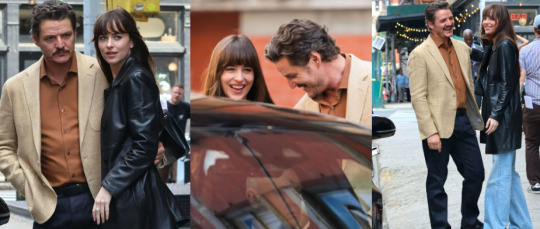
Part 4: Eyes on the Paddock
Practice day always feels like the calm before the circus. Except this morning, the circus was already rolling in. By 9 a.m., the paddock was alive, TV crews in place, PR managers buzzing like caffeinated bees, fans pressed against the barriers, phones ready. Security tried to keep a clear path, but the chaos was controlled at best. Sky Sports F1’s Rachel Brookes adjusted her earpiece and stood near the entrance gate, mic in hand, eyes trained on the team hospitality areas. She nodded to the cameraman. “Alright, we're rolling in three, two, one…”
“Good morning from the paddock,” she began, the signature warmth in her voice. “It’s Friday, it’s practice day, and we’re already seeing a few drivers arriving.”
From behind her, someone in the crowd screamed as Charles Leclerc strolled past in Ferrari red, smiling at Leo with Alexandra by his side. Moments later, George Russell appeared with Carmen beside him, both dressed like they had walked out of a campaign shoot.
Rachel turned slightly to the camera. “A few of the grid’s familiar faces are arriving with their partners today, a little off-track love before the focus shifts to race pace.”
Then the air shifted. It wasn’t loud at first. Just… aware. Phones lifted. People stood on their toes. There was a wave of murmurs, the kind that travels fast, faster than even a car down the straight. And then there she was. Monica, the grid princess, walked through the gates like she’d done a thousand times. Cool. Grounded. Calm with her usual sweet smile. Except this time, she wasn’t alone. Pedro Pascal walked beside her, their hands linked, his thumb brushing over her knuckles.
Rachel blinked, then leaned toward the camera with a slightly incredulous smile. “And… Monica Cruz is walking in this morning with none other than Pedro Pascal. That… is quite the entrance.”
Click. Flash. Shutter sounds like popcorn. Monica didn’t stop walking. She didn’t pose or break stride. But she looked up briefly, smiled toward the crowd, and gave a small wave with her free hand. Pedro leaned close to her ear, clearly saying something only she could hear. She laughed, genuinely, softly, like no cameras were watching. Rachel, still recovering, added, “Well, that’ll be the shot of the weekend before the engines even start.”
-----
Author note: I had this idea and just had to get it down, even if it’s rough or awkward. I know it’s not perfect, and I apologize if the writing feels unpolished, but I hope the story's heart came through and that you enjoyed the concept. I’d love to keep writing and improving, especially regarding details and dialogue. Next time, I want to include more of Monica interacting with the grid and the other drivers. I hope this first part of the story feels like a good start.
#f1 text imagine#angst#f1 fanfiction#f1 fic#friendship#fanfic#dakota johnson#pedro pascal#the last of us#joel miller#f1 drivers#f1 imagine#f1 x reader#f1 fandom#f1 fiction#formula 1#daniel ricciardo#sebastian vettel#max verstappen#carlos sainz#lewis hamilton#lando norris#charles leclerc#oscar piastri#vcarb#isack hadjar#f1#female driver#rumors#daddy issues
78 notes
·
View notes
Text

pssshhhh they know what'll get clicks
[translated from Korean]
The group ATEEZ has further expanded the emotional knot with their 12th mini album 'GOLDEN HOUR: Part. 3'. Since last year, ATEEZ has been linking the 'GOLDEN HOUR' series that contains their most shining moments. Following Goal (Part. 1) and Sincerity (Part. 2), this time they focused on moments of being drawn by using emotions as keywords, namely, attraction, heat, and the density of air current. ATEEZ has now established itself as a team that knows how to control the temperature and determination of music, rather than simply being a strong performance group. 'GOLDEN HOUR: Part. 3' shows a journey of understanding oneself through thirst and shaking, temptation and awakening. It deals with the impulse of suppressed emotions exploding, the alienation and recovery of emotions, and the moment of facing the essence of emotions. The title song 'Lemon Drop' is a summer season song, but it is different from the typical refreshing tracks. The song based on R&B and hip-hop bass has a refreshing appearance, but the dense and sexual texture is the center. The lyrics that put attraction at the forefront, such as "Hot summer night heat, just you and me party", "When your eyes sting, Parade in my head, I hope you take responsibility for my excited heart", are also sensual. The singing is also noteworthy. Rather than high notes, it is deep in the mid-low notes, and rather than striking from the front, it pushes and pulls within a certain groove. This is a change in emotional orientation that is different from ATEEZ's past days when they were called 'cheongyang pepper-flavored music', such as 'Fireworks', 'Pirate King', and 'Say My Name'. It is a shift from power to dense expressiveness. The music video visualizes the desireful energy of attraction. It captures the hot summer atmosphere and delicately balances the dance sequences and individual directing cuts. It also adds sensual objects such as sunlight, sweat, water, and cars to heighten the sensual emotional line of the song. The groovy yet sensual performance also catches the eye. In addition to 'Lemon Drop', all the songs on 'GOLDEN HOUR: Part. 3' reveal the layers of emotion. 'Castle' depicts a refuge as a space of healing rather than avoidance of pain, and emotionally persuades of the temporary escape needed at some point in life. 'Now this house ain't a home' depicts the movement of youth who choose a journey rather than settling down, and expands the emotional line in multiple layers. ATEEZ's 'GOLDEN HOUR' series functions as a project to experiment with how delicate the emotional line can be designed by removing the existing powerfulness. From the leisurely gaze of 'WORK', the flexible sense of 'Ice On My Teeth', and the seductive emotion of 'Lemon Drop'. ATEEZ turned to the direction of strengthening emotions by reducing power. And their choice to compete with density rather than intensity was right.
LINK
#ateez#kpop#song mingi#jeong yunho#park seonghwa#kim hongjoong#jung wooyoung#choi san#kang yeosang#choi jongho
28 notes
·
View notes
Text
Denver SEO Company: SEO Tips you Need to Know!!!!
Denver SEO Company: SEO Tips you Need to Know!!!
Each page on the SEO Expert in Denverwebsite must be optimized with a focus on On-Page SEO. This includes:
Titles and Meta Descriptions:
Ensure each page has catchy, descriptive titles with the right keywords. Use meta descriptions that invite users to click on results.
Headings (H1, H2, H3): Use heading tags to structure the content and make it easier to read. This also helps Google better understand the theme of the page.
Optimized Images:
All images must have ALT attributes with appropriate descriptions and must be compressed to improve loading. Practical Tips: Use main keywords in the title and URL. Insert internal links to guide the user to other relevant pages on the site. Create friendly, short and descriptive URLs.
Creating Quality Backlinks:
Backlinks, or links from other websites that point to yours, are a determining factor in Google rankings. Earn quality backlinks by:
Publish guest posts on relevant blogs:
Create partnerships with other companies and ask for links to the SEO Expert in Denver website. http://denverseo.company/ Publish case studies and financial reports that other companies may want to reference.
Practical Tips:
Build links on authority sites like media outlets and finance blogs. Avoid link building techniques that are considered spam, as Google may penalize the site. Have a digital Public Relations strategy, sending press releases.
Local SEO: Capture Customers in the Region:
SEO Expert in Denver can significantly benefit from local SEO, especially to attract customers in the Northeast region. For that:
Optimize your listing on Google My Business. Enter information about SEO Expert in Denver's location on the website. Encourage your customers to leave reviews online. Practical Tips: Include location in keywords, such as “Financial consultancy in Recife”. Use Google My Business to highlight events and related posts.
Video Content:
Video content is a powerful tool for SEO as it increases dwell time on the website. SEO Expert in Denver can create explanatory videos, interviews with experts and customer testimonials, covering topics such as “How to get credit for my company” or “The role of consultancy in fundraising”.
Practical Tips:
Publish videos to YouTube with optimized descriptions and website links. Integrate videos on the main pages of the SEO Expert in Denver website to increase engagement.
Off-Page SEO: Increasing Brand Presence:
In addition to backlinks, it is important to increase SEO Expert in Denver’s presence on other platforms and social media. Have a well-defined content strategy for LinkedIn, Instagram and Facebook, where you can share financial insights, promotions and educational materials.
Continuous Analysis and Adjustments:
SEO is a strategy that requires continuous analysis. Use tools like Google Analytics to track traffic and understand user behavior on your website. Adjust the strategy as necessary, always seeking to improve rankings and attract more qualified leads.
Practical Tips:
Monitor top-performing pages and update old content. Test different keywords and content strategies to see what generates the most leads.
Pillar Content Creation:
Create pillar content, which covers broad topics such as “Fundraising for Companies”, linking to more specific content (content clusters). This creates a hierarchical content structure that makes it easier for users to navigate and improves SEO. https://denverseo.company/about/
Conclusion:
To attract more qualified leads and improve SEO Expert in Denver website authority, it is crucial to implement a thorough SEO strategy. From technical optimization to creating valuable content and quality back links, each action contributes to organic growth. With these practices, SEO Expert in Denver can stand out as a reference in the financial consultancy and fundraising sector
25 notes
·
View notes
Text


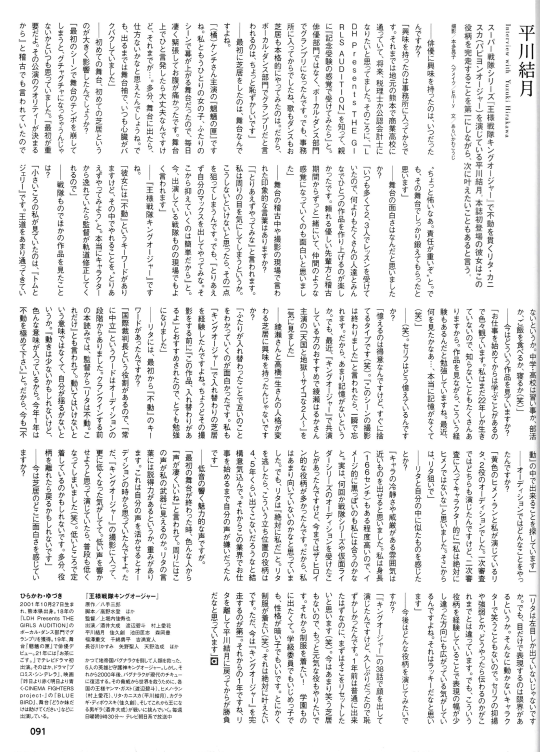
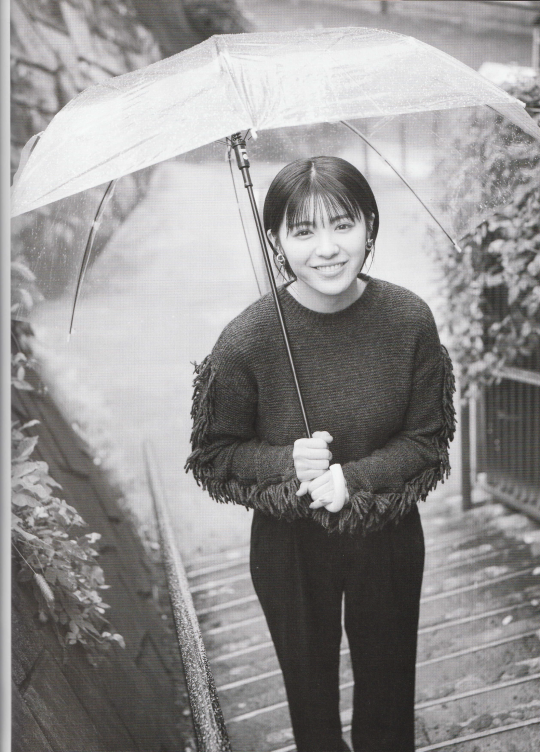
+act Magazine January 2024 Issue ft. Hirakawa Yuzuki Interview (translation below)
Publication: December 12, 2023
Hirakawa Yuzuki plays the immovable Rita Kaniska (PapillonOhger) in the Super Sentai series "Ohsama Sentai King-Ohger." In her first appearance in this magazine, she says that while her first priority is to complete this role, there are also things she wants to accomplish next.
"When did you first become interested in acting?"
Hirakawa: It wasn't until I joined my agency that I first became interested. Until then, I was attending a business high school in Kumamoto, my hometown, and wanted to become either a tax accountant or a certified public accountant in the future. Around that time, I learned about the "LDH Presents THE GIRLS AUDITION" and I told my parents, "I should enter like it's a commemorative entrance exam.*" I won the Grand Prix in the vocal and dance category, not the acting category. However, it wasn't until I joined the agency that I tried singing, dancing and acting genuinely. So, it was abit embarrassing being told that I was the Grand Prix winner in the vocal and dance category. (*exams taken for schools you have little to no chance of getting into)
"Your first performance was in a stage play."
Hirakawa: It was in "Moryo no Hako" starring Tachibana Kenchi-san. The play was set where the curtains rise on a scene between me and another girl, and I was so nervous that it caused my stomach to hurt every day. Once I said a few words on stage, I was okay, but until then…I guess that once I got on stage, I felt like I had no choice. But, until I was offstage, my heart would be pounding like crazy.
"Did the fact that it was your first time on stage, and your first performance, have a big impact on you?"
Hirakawa: I always thought that if I broke the tempo of the play in the first scene, things would become out of sync. Even during rehearsals I was told, "The beginning is important. It determines the quality of the performance." That's kind of scary. It's a big responsibility. But, I think they trained me well on that stage.
"What did you find interesting about the stage?"
Hirakawa: I always took lessons with two or three people at most, so more than anything, I enjoyed creating a production together with many people. I also thought it was fun to be with my dependable and kind seniors all the way through the rehearsal period, and that they started to feel like friends.
"Were there any memorable words that were said to you during rehearsals for the play or on the stage itself?"
Hirakawa: They'd say "Just try things out for now." I think I tend to worry about what other people think of me. If I think that I have to do something, I focus on only that. Still, I was told, "Just give it your all for now. It'll be easy to control things from there." This is often said on the set of the Sentai series that I'm currently performing in.
"Ohsama Sentai King-Ohger, right?"
Hirakawa: Their keyword is "Immovable," and I do what I can within that context and to "just give things a try." If I really deviate from the character, the Director will get me back on track.
"Have you seen any other Sentai productions?"
Hirakawa: When I was little, I watched "Tom and Jerry." I haven't really watched the previous series. In middle and high school, I was either doing practice lessons, club activities, eating meals, or sleeping (laughs).
"What kind of programs do you currently watch?"
Hirakawa: Since I started working, because I have alot to learn, I've been watching various things. I've only been alive for 22 years, so there are many things that I don't know. I'm learning about these experiences as I watch these works. What have I been watching…I really can't remember (laughs).
"(laughs). How do you remember your lines?"
Hirakawa: One of my strong points is memorizing things, but I'm the type of person who (intentionally) forgets them immediately (laughs). When they say, "We're done filming this scene," I instantly forget about it. So, I don't really remember much. Recently however, at the recommendation of a co star in King-Ohger, I watched the entirety of "Heaven and Hell: 2 Psychos," starring Ayase Haruka-san.
"Were you interested in Ayase-san and Takahashi Issei-san's personality changing performances?"
Hirakawa: It was interesting to see how the two of them came to know each other through swapping bodies. I also experienced performing a body swap in King-Ohger. Before we filmed it, it was recommended to me with, "This show, it's got body swapping," so I learned alot from it.
"For Rita, did they have the keyword "Immovable" from the beginning?"
Hirakawa: Since my role is that of the International Chief Judge, the words "always neutral" were there from the audition stage. When I was reading the script before filming started, the Director said to me, "Rita is Immovable. That's it." It doesn't mean that they shouldn't move, but that they're unwavering. I was also told, "There may not be much movement, but it holds various meanings. Please be extremely immovable this year." That's why even now, I'm looking for things I can do within being "immovable."
"What did you do at the audition?"
Hirakawa: It was an audition for two roles, the yellow Hymeno Ran, and Rita, who I'm playing. I played both roles in the first round, but when I entered the second round, in terms of her character, I thought, "I'm definitely not Hymeno." From there, I went after Rita.
"Did you feel any similarity between Rita and yourself?"
Hirakawa: I thought I could create something close to the calm and dignified feeling of the character. I'm also pretty tall (166 cm, 5'5"), so I thought that the darker color would also suit me in terms of image. Actually, I had auditioned for the Sentai series and Kamen Rider series multiple times, but most of the roles I've gone for up until now have been for the heroine. So, I thought it wasn't really suited for it. But, with Rita I thought, "That's definitely me." I was pretty enthusiastic, thinking that if I missed out on Rita, I wouldn't get a role like this for about four or five years. And then, until I started working in this industry, I hated my voice.
"But it's an attractive voice, with a deep bassy tone."
Hirakawa: When I finished my first performance, many people said to me, "Your voice is really nice." Do the people around me see this voice as my weapon? Rita's words are very persuasive, or rather, have weight to them. I knew from the audition that I could use my voice in this role. However, since filming started in King-Ohger, I felt that my voice has become even lower. I was trying to make my voice sound deeper, but I ended up sounding lower than usual (laughs). I might be stuck with this low voice. Maybe it'll go back to normal once this role ends.
"What do you currently find interesting about performing?"
Hirakawa: Rita only keeps their left eye visible, right? However, there's a limit to what can be expressed with just the eyes. They're a character that doesn't move that much and doesn't laugh. Things like the inflection and intensity of my lines and how they're conveyed are different from how it's been in the past. Still, by experiencing this kind of role, I feel that the range of my expressions have expanded in slightly different directions. I think I'm lucky.
"What kind of roles would you like to play in the future?"
Hirakawa: In episode 38 of King-Ohger, I performed with my face showing, but I was embarrassed since it had been awhile. A year ago, I would've been able to do it normally, so first of all, I'd like to "reset" that (laughs). I don't have much of a funny role now, so I'd like to play more energetic roles. Also, I want to wear a uniform! I want to be in a school story. It doesn't matter if I'm a class president, a bully, or some kid with a depressed personality. I just want to wear a uniform (laughs). I definitely want to make that happen. But for now, my first priority is to finish King-Ohger. It's been a year, and I think the real battle afterwards will be letting go of Rita and returning to Hirakawa Yuzuki.
#I want school bully yuzuyan#ohsama sentai kingohger#kingohger#super sentai#my scans#my translation#rita kaniska#rita kanisuka#hirakawa yuzuki#yuzuki hirakawa#toku cast#tokusatsu#ohsama sentai king ohger#king ohger#plus act magazine#interview#magazine#papillon ohger#yuzuyan#I only just found out she was in this issue#she referred to rita with kanojo in one answer#I still wrote it as they
90 notes
·
View notes
Text
Amal p k Your Gateway to Top Freelance Digital Marketing Services in Kerala

Introduction In today’s digital-first world, having a strong online presence is no longer optional—it’s essential. For businesses in Kerala looking to thrive in the competitive digital landscape, Best freelance digital marketer in kerala | calicut | kochi stands out as a trusted partner. Specializing in freelance digital marketing and SEO services, Best freelance digital marketer in kerala | calicut | kochi is helping businesses unlock their full potential online. In this blog, we’ll dive into what makes Best freelance digital marketer in kerala | calicut | kochi the go-to choice for businesses seeking the best freelance digital marketer in Kerala.
Why Choose Best freelance digital marketer in kerala | calicut | kochi?
Expertise in Freelance Digital Marketing Best freelance digital marketer in kerala | calicut | kochi is home to some of the top digital marketers in Kerala, offering a wide range of services, including SEO, social media marketing, content marketing, and more. Their team of skilled freelancers ensures that your business gets the attention it deserves.
Tailored SEO Strategies As a leading SEO specialist in Kerala, Best freelance digital marketer in kerala | calicut | kochi focuses on creating customized SEO strategies that drive organic traffic and improve search engine rankings. Whether it’s on-page optimization, keyword research, or technical SEO, they’ve got you covered.
Cost-Effective Solutions Hiring a full-time digital marketing team can be expensive. Best freelance digital marketer in kerala | calicut | kochi offers affordable, high-quality freelance digital marketing services, making it the perfect choice for startups and small businesses.
Proven Track Record With a portfolio of successful campaigns and satisfied clients, Best freelance digital marketer in kerala | calicut | kochi has established itself as one of the best digital marketers in Kerala. Their results-driven approach ensures that your business achieves its online goals.
Services Offered by Best freelance digital marketer in kerala | calicut | kochi Amaldigiworld.in provides a comprehensive suite of digital marketing services, including:
Search Engine Optimization (SEO): Boost your website’s visibility on search engines.
Social Media Marketing: Engage your audience on platforms like Facebook, Instagram, and LinkedIn.
Content Marketing: Create compelling content that resonates with your target audience.
Pay-Per-Click (PPC) Advertising: Drive instant traffic with targeted ads.
Website Design and Development: Build a user-friendly, responsive website that converts.
Analytics and Reporting: Track your performance and make data-driven decisions.
What Sets Best freelance digital marketer in kerala | calicut | kochi Apart?
Local Market Understanding Being based in Kerala, Best freelance digital marketer in kerala | calicut | kochi has a deep understanding of the local market. This allows them to create strategies that resonate with the target audience in Kerala.
Client-Centric Approach At Best freelance digital marketer in kerala | calicut | kochi, the client always comes first. They take the time to understand your business goals and tailor their services to meet your unique needs.
Transparency and Communication Clear communication and transparency are at the core of Best freelance digital marketer in kerala | calicut | kochi’s values. They keep you informed at every step of the process, ensuring a seamless collaboration.
Focus on Results Best freelance digital marketer in kerala | calicut | kochi doesn’t just promise results—they deliver. Their data-driven strategies are designed to maximize ROI and help your business grow.
Success Stories: How Best freelance digital marketer in kerala | calicut | kochi is Transforming Businesses Amaldigiworld.in has helped numerous businesses in Kerala achieve their digital marketing goals. From increasing website traffic to improving search engine rankings, their success stories speak for themselves. Here are a few examples:
A local e-commerce store saw a 300% increase in organic traffic within six months of partnering with Best freelance digital marketer in kerala | calicut | kochi.
A Kerala-based restaurant chain experienced a 50% boost in online reservations after implementing their social media marketing strategies.
A startup in Kochi achieved top rankings for competitive keywords thanks to Best freelance digital marketer in kerala | calicut | kochi’s SEO expertise.
How to Get Started with Best freelance digital marketer in kerala | calicut | kochi Ready to take your business to the next level? Here’s how you can get started with Amaldigiworld.in:
Visit Their Website: Head over to Amaldigiworld.in to learn more about their services.
Schedule a Consultation: Book a free consultation to discuss your business goals and requirements.
Get a Customized Plan: Receive a tailored digital marketing plan designed to achieve your objectives.
Watch Your Business Grow: Sit back and watch as Best freelance digital marketer in kerala | calicut | kochi helps you achieve measurable results.
Conclusion In the ever-evolving world of digital marketing, having the right partner can make all the difference. Best freelance digital marketer in kerala | calicut | kochi has proven itself as one of the best freelance digital marketers in Kerala, offering expert SEO services, innovative strategies, and a client-centric approach. Whether you’re a startup, small business, or established brand, Amaldigiworld.in has the tools and expertise to help you succeed online.
Don’t let your competitors steal the spotlight—partner with Best freelance digital marketer in kerala | calicut | kochi today and take your digital presence to new heights!
Visit Amaldigiworld.in now to explore their services and schedule a free consultation. Have questions or thoughts? Drop them in the comments below—we’d love to hear from you!
#freelance digital marketer in kerala#seo specialist#digital marketing freelancer#top digital marketer#best digital marketer in kerala#best freelance digital marketer in kerala
16 notes
·
View notes
Text


death in the trench
Golden Kamuy fanmix. mentally ill military men.
[listen on Spotify]
Keywords: angst, guilt, self-loathing, metalcore, (post)hardcore, emo, J-rock, shoegaze, OST
Tracklist*, image source, etc. below
*Tracklist updates periodically.
Selected Tracks
Constance - Spiritbox (Yuusaku being pressured by Ogata, bayonet trench scene)
Colorblind - Movements (Ogata and Yuusaku, brothers)
Dealer/Debtor - Defeater (rushing trenches, Tanigaki finds Aoyama)
Here I Stand - yuragi (Otonoshin mourning Heinojou Koito)
Loom - Frameworks (Sugimoto’s encounters with Kouhei Nikaidou)
Your Clothes - Can't Swim (Sugimoto post-head injury)
The Hellfire Club - Thornhill (Vasily pandering over Ogata)
Call From You - Anxious (Sugimoto anticipates meeting Umeko again)
Ogata-centric
self-hatred x100, misery, illness
Vore - Sleep Token
The Grey - Movements
Cowardice - Defeater
Bastards - Defeater
Tsukishima-centric
heartache, yearning, anguish
Purge - Frameworks
Daydreams - I'm Glad It's You
Lonely star - Age Factory
時のゆらめき - イツエ
海と花束 - Kinokoteikoku
Sit and Mourn - Knocked Loose
Notes
The lyrics don't always apply to the character or scene. Sometimes, I relate music purely on how it sounds including instrumentals, or vocal performances.
Image Source
Cover: (https://www.edohakuarchives.jp/detail-22892.html) Playlist: (https://www.gettyimages.com/detail/news-photo/colorized-photo-of-japanese-officers-several-with-news-photo/1280330244?adppopup=true)
#fanmix#golden kamuy#ogata hyakunosuke#tsukishima hajime#koito otonoshin#hanazawa yuusaku#Kouhei Nikaidou#sugimoto saichi#i have a lot of feelings#i can't control myself so here it is
34 notes
·
View notes
Text
WARNING : OPINIONATED, AGREE TO DISAGREE, some speculative things. Mercedes shooter/snowflakes who hate getting their opinions hurt/who close their eyes blind fuck off
I'm a Mercedes defender but you CANNOT say that at ONE POINT in George's career, they can be manipulative af.
Two things can be TRUE, AT THE SAME FUCKING TIME:
1. Mercedes helps and choose George, George loves and choose Mercedes
2. At some point of his career, there were manipulative acts performed by Mercedes.
Let's talk from the beginning
I don't think i need to tell the story about George's powerpoint presentation saga anymore because all of us know it. But shortly,
His manager got a hold of Toto's email > George sent his CV > Toto saw em and invited George > George came ALONE to Toto's office and there were other higher ups > presentation > Toto mesmerized because of how George is very brave to go inside his office and present his "why you should pick me" CV alone without parents/manager > Toto want him in the junior team but can only offer an ass team > George refused for an English team (Carlin Volkswagen) > Toto say "i told you you're wrong but let's keep on contact"
Then George blew his expectations. Did a pretty good season in F3 EU first year. But he got into a financial problem which he later resorted to testing for BMW in DTM as he looked for plan B. He cooked their. First on the record, allegedly beat Audi and Mercedes too. BMW liked George so much that they threw him a $$$,$$$ contract directly. But the testing saga was leaked by an ex-BMW employee who moved to Mercedes and Mercedes came back to George.
Okay, if you're saying "oh awreeee, but george chose mercedes" oh amandaaa, for the second time, it was mercedes who approached george.
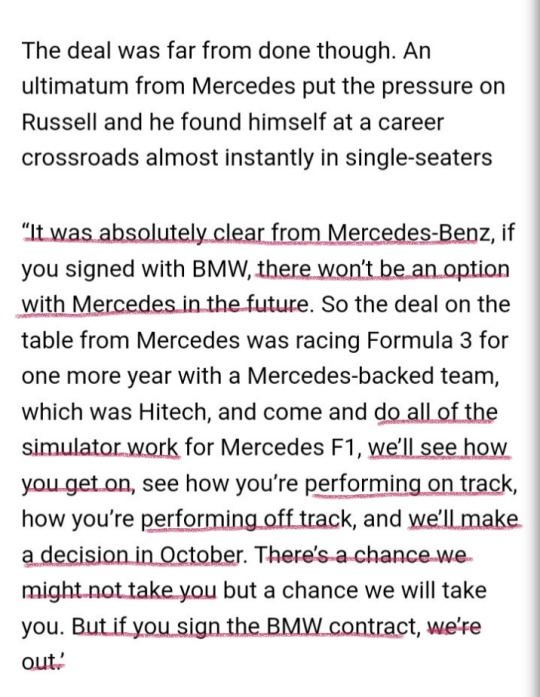
Although George in the end DID choose Mercedes, you can't look at this statement and tell me "oh my word! this is so pressure-less! i bet they're having tea over this talk!" 🥰🥰🥰 "Oh but Ari this is normal-" you're talking to me here as someone who will NEVER be in the position of money-less and your dream in the verge of getting over.
The keyword here is "It was absolutely clear from Mercedes-Benz". You are EIGHTEEN or SEVENTEEN with a career most possibly focused on racing. And a powerhouse company said "there won't be an option with Mercedes Benz in the future (if you pick BMW)". And if you look at it, you don't need to be a Law Student or a Comms Student to know that the deal they're offering to George is so fucking ass. Do ALL the sims for Merc, they test you on and off the track. All that and they say "oh but we won't be so sure tee hee~ we'll get back to you in October 🩵🩵🩵". All that while not letting him keep the BMW contract. George did choose Mercedes, but you can't tell me that there is no pressure (or minor gaslighting) at all from a big company who had ventures in GT/DTM/F1 to a 17/18 y.o who had financial problems and is desperate to continue his career.
Second. During this "test" period for George's second year at F3 EU. They also did not allow him to continue with Carlin despite George wanting to because Carlin is supported by Volkswagen. He had to opt for Hitech, a completely new team (rumored to get that discounted price seat in exchange for driver coaching his teammate Mazepin, whose father sponsors Hitech)
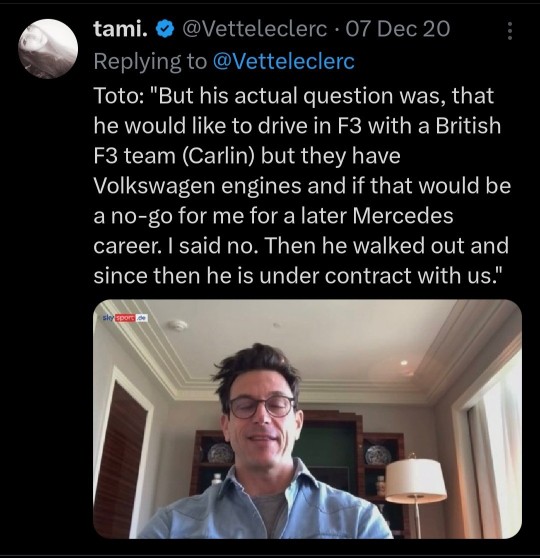
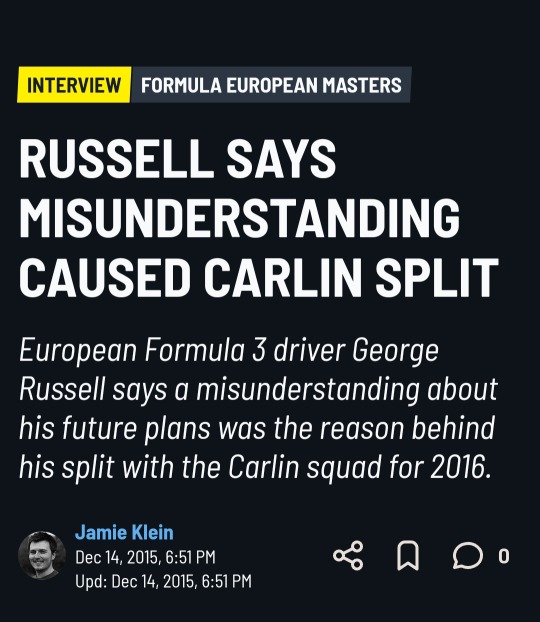
You can have a different opinion about this and you might say "eh but that makes sense, it's job obligation" but for me "why let go of Carlin VW when they don't even guarantee anything about George's seat in the junior team"
Other saga of this "shady ass slightly manipulative shit" Merc did? Whatever that Red Bull saga is
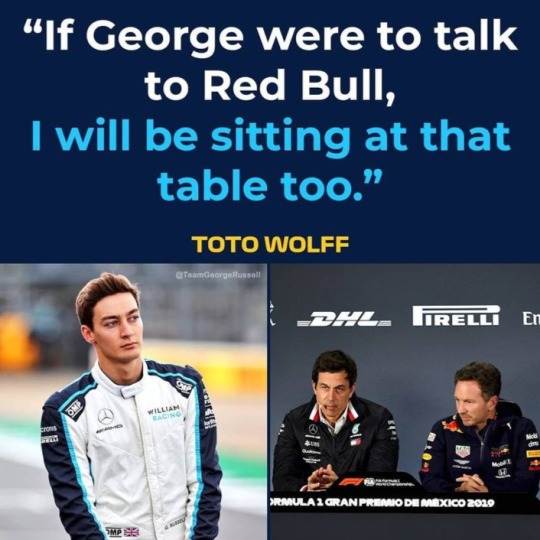
The fact that they said this while also thinking about someone else in that Merc seat in 2022 LOL 💀💀💀 Even when George was almost out of his seat in 2020, they'd rather send George to GT or DTM than let him go to Red Bull or other team. In 2020, he was linked to a Ferrari or McLaren seat. You can say "why would you want him-" and I'll say that you only say this because you're in the future now and you know George is in Mercedes. But if you were BACK THEN and he's on the verge of getting his seat grabbed by someone else and his team snoozed around just because they won't let him go, you'd want to bite their neck off too.
But yeah as I said earlier, this is my opinion and some of the red flags I see. You can't 100% glorify Mercedes for helping George. I'm very thankful they helped George throughout his career. George is in his place now partly because of Mercedes. But let's not act like Merc is a divine angel for helping someone out. They did some red flags too. George chooses them, YES. But let's not act like there is absolutely no pressure at all to a minor at that time.
31 notes
·
View notes
Text
Shinko Music Mook - Black B-Pass #01 (2015)
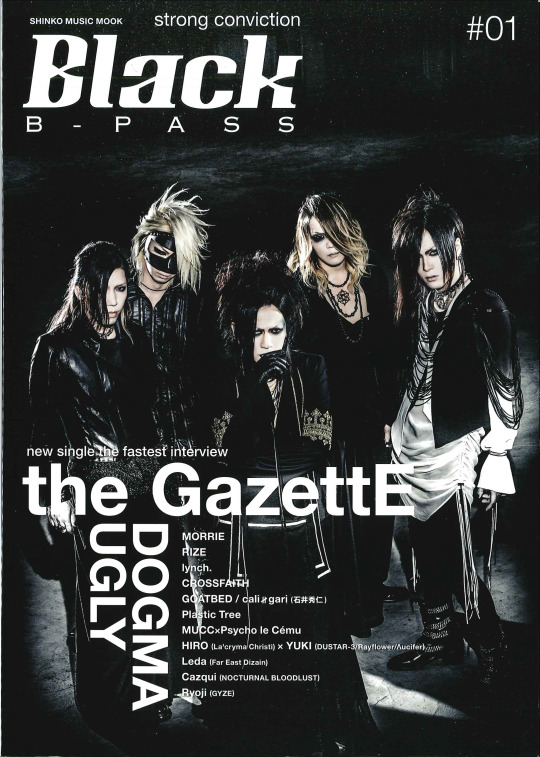
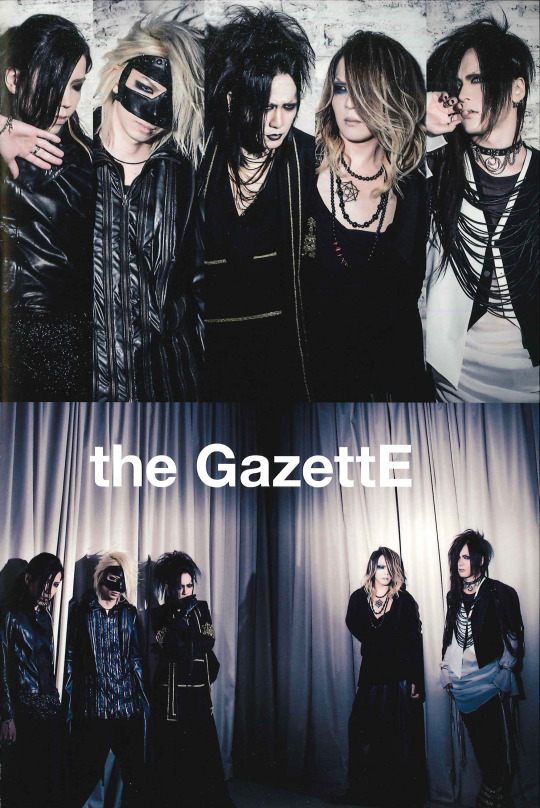
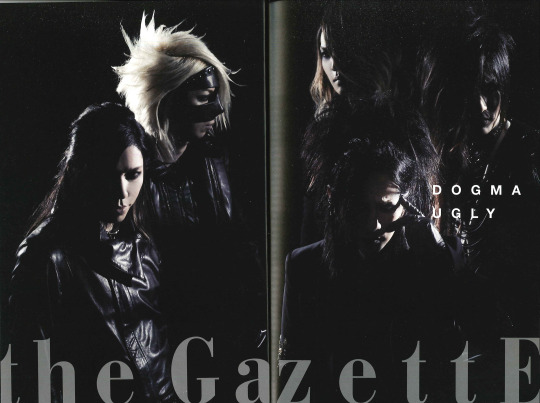

Pursuing Their Own Path: A Singular, Unyielding Blackness. Relentlessly Amplifying Raw Anger—This Is the Reality in Motion.
This March, during their 13th-anniversary live show at Nippon Budokan, the GazettE suddenly introduced the keyword “PROJECT: DARK AGE.” This initiative marked the genesis of a journey, with their new album DOGMA as its starting point, released on August 26. Bearing the name “dogma,” the album delves into the very essence of the band, encapsulating a sound born of their inner truths. With RUKI’s unrestrained lyrics and vocals channeling raw rage and despair, it creates an overwhelming world of darkness—deeper and blacker than black itself, an absolute jet-black (Shikkoku) realm swirling with intensity.
While still fully immersed in the world of DOGMA, the GazettE is already firing off their next signal: the new single “UGLY.” Depicting the “raw current reality,” this track hints at the world that lies beyond DOGMA. In this series of personal interviews, we delve into the current state of the GazettE and explore their evolving reality.


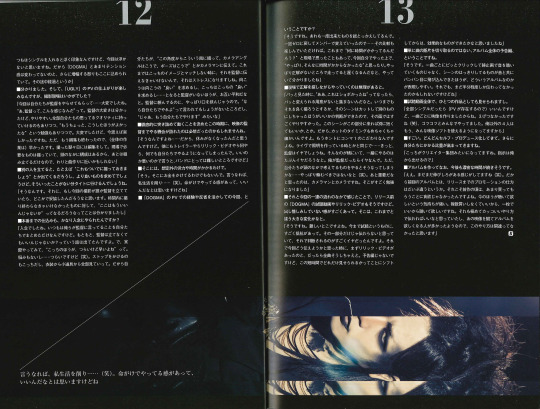
Interviewer: It’s just the right timing to hold the CD sample of the album DOGMA in your hands (this interview took place in late August). Seeing it take shape like this, do you feel a sense of accomplishment?
Ruki: I do feel like it’s finished… but it's not the kind of work that feels complete with just one album. I think we’ve completed one stage, but there’s still more we need to create moving forward.
Interviewer: Even so, you’ve really been going nonstop, haven’t you?
Ruki: It’s no exaggeration to say we didn’t have a single break (laughs). I think we managed to shape it, but there are still many things currently in progress. I’ve got enough things I want to say to fill another album (laughs). That’s why I think it’s great that we were able to release a single at this timing, and I feel like the rawness of it works well.
Interviewer: Speaking of the single, I’d like to ask about UGLY. Fans must have been surprised to see it drop while the afterglow of DOGMA is still lingering.
Ruki: Yeah, we talked about how we should release something after the first half of the tour ended. Everyone felt that it would be better to have something in place when the second half of the tour (DUE), begins.
Interviewer: Since it wasn’t recorded during the album sessions, it’s impressive that you managed to complete it amidst these hectic days.
Ruki: Haha, yeah. Actually doing it was, of course, tough, but we approached it as an extension of the album while thinking about creating something DOGMA didn’t have. So, I didn’t overly focus on the idea of it being a ‘single.’ Singles usually take a lot of time, but we managed to avoid that, and we completed it pretty quickly. It only took about four days in total.
Interviewer: Is that so! The title track, UGLY, has a sense of tempo and hardness that feels like it’s destined to become a staple in live shows. Was it created with that in mind?
Ruki: The idea itself came about simultaneously with the music video. It was like, ‘I want the video to be this kind of concept, so let’s create a track with this kind of tempo.’ I could visualize the imagery pretty early on. Also, since -DUE- would revolve around this track, making it suitable for live performances was an absolute priority, along with adding elements that DOGMA lacked.
Interviewer: I heard the PV has a live-like atmosphere with a lot of extras playing the audience, so I initially thought the lyrics would carry a theme that gathers positive energy… but then...
Ruki: You might think it’s a song about live performances, it’s something completely different. The fundamental theme of the lyrics revolves around the concept of 'judgment.' It’s written with that consciousness in mind, tying strongly into the world of DOGMA.
Interviewer: The title and every choice of wording in the lyrics are so intense. The entire song seems ready to burst with anger. Does this emotion represent the raw reality you mentioned earlier?
Ruki: That’s right. Well, from our perspective, it’s probably a bit too real (laughs).
Interviewer: Looking at the lyrics again, they resonate with even greater intensity… especially with lines like “Death to Traitors.”
Ruki: The overall theme is very much like that. It’s filled with imagery of sacrifices and punishing traitors. The PV also has “Seven Deadly Sins” as its theme, focusing on desires (greed), which are considered human sins, and placing the human subject on stage (laughs).
Interviewer: Does anger often serve as the motivation to create songs?
Ruki: Yeah, it’s pretty much always like that, so it feels like I can’t write about normal things anymore. Rather than writing about something unrealistic, it’s easier for me to write about themes that reflect the anger we feel. The challenge is figuring out how to express that anger. Choosing the right words is particularly difficult.
Interviewer: The sections with English lyrics are especially direct, aren’t they?
Ruki: Yeah, it ends up being things like ‘scaffold’ and such (laughs). In the end, I wrote my emotions toward ugly people in a very direct way. But it’s tough to explain—it’s a rather taboo subject. Still, that’s precisely why I turned it into a song. I feel like these circumstances have made the band’s unity even stronger.
Interviewer: Even though it was decided that you’d release a single at this time, I doubt anyone expected it to carry such a message.
Ruki: Right, you can’t plan something like this out to such detail. That’s why I thought it would be fine to simply put out the raw feelings and the reality of the current situation. It’s not something joyful, but it’s definitely driving us forward.
Interviewer: It’s something that requires toughness to pull off, isn’t it?
Ruki: Absolutely, you need to be tough to do this. But it’s not just me—I’ve got comrades here with me, and I think that’s what translates into power. When expressing ourselves as a band, the way we pour our emotions into the music is different, and maybe that’s what sets this apart from our past work. It’s less about my personal hatred and more about the collective emotions of the band.
Interviewer: While the emotions are straightforward, the poetic expressions, like ‘Resound the hatred for every sin committed,’ are woven carefully throughout the lyrics.
Ruki: Visually, it may seem that way. If you sum it up in just a few words, it might lose its depth. But as a piece of work, I’ve written it in a way that matches the music properly. The theme of this single was a coincidence, but I still have plenty of things I want to let out.
Interviewer: The track DEPRAVITY, also composed by you, RUKI, seems to have come together at the very last moment. Was it necessary as the final piece, with its intensity and driving speed?
Ruki: This one came about purely from the energy I was feeling at the time. With DEPRAVITY, I was writing the lyrics and the music almost simultaneously, so it was a very ‘Arghhh!’ kind of feeling (laughs).
Interviewer: I see (laughs). The title, meaning “corruption,” is striking as well. Since the song and lyrics are so tied to raw impulses, was the recording process carried out with that same momentum?
Ruki: No, recording can’t just rely on momentum. When creating a work, you have to approach it calmly and with precision. That contrast can be challenging because, on one hand, there’s a part of me that just wants to destroy everything. Sometimes, mentally, it feels like I’m in a state where I shouldn’t even be making music, but I condense those emotions into the work. Expressing those feelings through music is probably the best thing for this band. Anger as an emotion isn’t inherently good, but having a space where we can release it is a positive thing. If we were a pop band, there’s no way we could express ourselves like this, right?
Interviewer: That’s true… (laughs).
Ruki: A pop band has its own musical style, of course. but I’m glad we’re a band with this kind of sound.
Interviewer: In a way, expressing these feelings helps you maintain a balance between your mind and body.
Ruki: Yes, in the sense that I can release it all.
Interviewer: Also, I noticed that both UGLY and DEPRAVITY feature rather long guitar solos, which I felt was very characteristic of your style, Ruki.
Ruki: Oh, really?
Interviewer: For example, in BEAUTIFUL DEFORMITY, the outro of LAST HEAVEN had a highly expressive guitar solo. Since DOGMA didn’t emphasize those kinds of elements as much, it made these solos feel even more dramatic.
Ruki: Ah, I see. It wasn’t like I deliberately avoided including solos in DOGMA, but here I wanted something that would elevate the feeling even more than the chorus—something emotional. In my mind, guitar solos are something that naturally belong in the music, so I didn’t think much of it.
Interviewer: But in today’s music scene, that’s not necessarily the norm anymore.
Ruki: That’s true. For these two songs, I purely felt that a solo was necessary in those moments.
Interviewer: I’d also like to ask about the vocal style. In the opening of UGLY, you use a guttural, raw death voice—something we haven’t really heard from you before. It amplified the sense of anger and gave the impression that your range of expression has expanded.
Ruki: During the recording process, I try out a lot of different shouts, often asking myself, “Can I do this? Should I give it a try?” It’s pretty experimental on the spot. My vocal approach has changed quite a bit since DOGMA. It felt like a natural progression—while singing as I usually do, I found myself thinking, “Maybe lower is better for this part,” and it evolved from there. It’s not like I’m consciously pushing that style, but I do think it’s good to have moments where I can bring that strength to the forefront. In DOGMA, there were elements that leaned more toward metal, but here, there’s more of a hardcore influence—like the kind of music I listened to back in high school. I also felt that the Japanese lyrics worked really well. In fact, I think it might have been nice to include even more Japanese lyrics this time.
Interviewer: With lyrics like “F**K,” if you added even more Japanese, things could get pretty intense… That said, the presence of these two tracks (UGLY and DEPRAVITY) really enhances the emotional impact of the mid-tempo, lyrical track GODDESS.
Ruki: Its atmosphere didn’t feel out of place within the world of DOGMA, and when I listened to the song, I simply thought, “This is a good one; let’s include it.” There were other candidates, some of which were far harsher. There was even one insanely difficult track.
Interviewer: So, there are still “sleeping lions” lurking in the vaults?
Ruki: Yep, there were definitely some lions (laughs).
Interviewer: In terms of its tone, GODDESS feels somewhat calming, and the lyrics also seem to cool things down compared to the other two tracks.
Ruki: If we’re talking about contrasts—stillness and motion—it falls into the stillness category. But there’s still a sense of despair in it. In terms of bipolarity, it is on the depressive side (laughs). That said, it’s not so much about being broken but rather about being beautifully composed. So while the song as a whole isn’t necessarily positive, there’s a part of it—like in the line about ‘living’—that could be interpreted as positive. It’s not leaning toward death.
Interviewer: When it comes to your lyrics, even if anger or negative emotions are central, there’s often a faint glimmer of light or hope. However, this single feels different—it’s harder to see that glimmer, and it seems deeply introspective.
Ruki: Yeah. It’s more like, “Is there even salvation in this?” When I think about the feelings I had while writing these lyrics, it’s definitely not the kind of place where you’d think, “If I work hard, everything will turn out okay.”
Interviewer: People tend to think that artists are somehow removed from this kind of world, don’t they?
Ruki: That's true.
Interviewer: But by creating lyrics like these, born from a very real place, people who are currently struggling might find a sense of shared understanding, and that could give fans strength.
Ruki: Indeed. Even if the form is different, there are probably parts they can relate to. Not many people put out things like this—it might be hard to convey, but I want to express it anyway. Honestly, I’m just writing about things that are actually happening. Right now, this is all I can write. You can consider everything from DOGMA onward as reflecting the real, ongoing struggles we’ve been experiencing. What I’d like fans to know is that this isn’t about inner conflict within the band. That’s not the case at all. However, whenever we talk about the lyrics in interviews for DOGMA, the mood always gets dark by the end (laughs). Fans often say it reminds them of DIM, and to be fair, they might not be wrong. Back when we made DIM, my mental state wasn’t great, and things within the band weren’t exactly smooth either. We were working in a very tense atmosphere. That tension fueled the aggression in the music back then. Similarly, while this current aggression might be inward-facing like DIM, the band itself is doing really well right now. So if people feel a resemblance to DIM in that sense, I can see why.
Interviewer: How do you see this single as a finished product?
Ruki: It’s a bit strange, but I feel like each track is its own separate entity. Emotionally, it wasn’t like, “We’re putting out a single!” It felt more casual when we recorded it. It feels more like we’ve put out a weapon of sorts. It came about naturally from the momentum of DOGMA, so even though it’s intense enough to make people think, ‘Wait, this is a single?!’ you could think of it as a bonus track to DOGMA. A kind of hidden track, you know? If DOGMA would have had more tracks, these songs probably would’ve been included. Singles usually tend to stand out from albums, but this time, I don’t think that's the case. The energy matches DOGMA, and the anger has only been amplified in these songs. It feels like a continuation in that way.
Interviewer: Understood. I’m looking forward to the finished UGLY PV. How was the filming process?
Ruki: This time, we took on the role of directors ourselves… and it was tough. I thought, ‘Oh, so this is what it’s like to be a director.’ I definitely gained a new appreciation for how hard directing can be. At the same time, it was easier in some ways, because we could achieve the exact quality we envisioned. That said, there are also parts where I think, ‘Ah, we could’ve done this better.’ It was a challenging experience, but looking back, it was fun. And now the editing is already done. The whole process moved quickly—we wrapped things up just a couple of days after filming. Since the structure and elements we needed were already clear, it was just a matter of assembling everything. In that sense, it’s a bit like creating music.
Interviewer: When working with an external director, there might be moments where they suggest, “Let’s shoot this as well while we’re at it.” But since you didn’t, things were probably tighter and more focused.
Ruki: Exactly. And if we had worked with a director this time, I think there would’ve been moments of compromise. For example, with a tight filming schedule, you might just say, ‘This part is fine as it is,’ and move on. That realization hit me during this process.
Interviewer: Did you do a lot of preparation before the actual shoot?
Ruki: Yeah, we were meticulous. Usually, we’d communicate our ideas to a director, but this time, we handled all of it ourselves. There was already talk like, “Maybe we don’t need to hire a director for this.” So, we gave it a shot, and it turned out to be faster, albeit more demanding. There wasn’t any back-and-forth or second-guessing, so it was straightforward in that sense—though exhausting (laughs).
We oversaw everything, from costumes to props. We’d give the instructions like, “Shoot from this angle, set up the camera like this, pose like that,” directly to the cameraman. Previously, if something didn’t align with our vision, we’d have to convey that to the director, which could be frustrating. They have their idea of what’s “good,” and we have ours. Without a director, it’s just easier and more peaceful.
When we’ve worked with directors in the past, we’d often find ourselves interjecting with our input. It gets to the point where they could rightfully say, “Well, why don’t you just do it yourselves?” So this time, we thought, “Fine, we’ll do it ourselves.”
Interviewer: It feels like taking on the role of director during this intense period was almost inevitable.
Ruki: That’s how it feels, right? Which is probably why we don’t have any free time anymore (laughs). On top of everything else, we’ve started handling trailers, lyric videos, and other visuals ourselves. Whether that’s good or bad for the band is hard to say.
Interviewer: It seems like this process required an unexpected amount of effort and time.
Ruki: Absolutely. And it’s not like we’re pouring money into it either. To put it bluntly, we’re sacrificing our personal lives (laughs).There’s this feeling of giving it everything you’ve got, It's like we’re putting our lives on the line. And in a way, I think that’s a good thing.
Interviewer: Did you incorporate lessons from making the DOGMA PV into this project?
Ruki: We did. With DOGMA, we initially went with one concept but ended up scrapping it entirely and starting over. We reset everything to zero and reworked it as a band. I think people can enjoy comparing the two approaches. On set, there were moments when I wondered, “Why is this taking so long?” This time, after doing it ourselves, I realized, it didn’t actually need to take that much time. When you’re working without a clear solution in sight, everything tends to slow down, and I learned that firsthand.
Interviewer: It’s almost impossible to figure things out on the spot without a clear direction, isn’t it?
Ruki: Exactly. If you look at something and go, ‘Wow, this turned out underwhelming,’ you have to be ready to scrap it and pivot immediately. You can’t keep trying to salvage something that isn’t working. Instead, cutting the scene entirely and replacing it with something better is often the right move. This time, it was easier to make those decisions. For example, I’d think, “If this scene fits here, it’s fine for it to be shorter.”
That’s why the timing of the cuts was incredibly precise. We were obsessing over things down to fractions of a second. Honestly, if I were a director, I’d hate having someone like me hovering nearby and micromanaging every detail (laughs). Having someone like that next to you, giving input the whole time… I can imagine it’d be unbearable. And that’s why I’ve concluded it’s better not to rely on a director (laughs). Another important takeaway for me was the critical role of the cameraman and the camera itself. I learned a lot in that area this time around.
Interviewer: In this recent phase, especially with the lyric video for DOGMA before its release, it felt like there was no sense of holding back. That seems like a big shift compared to before.
Ruki: Yeah, it is. It’s a tricky balance. In the past, I’ve had a lot of resistance to previews or teasers. I always felt that just showcasing a small piece of a song didn’t convey its essence, and I hated the idea of people judging it based on that. But this time, when we thought about how to present it, the idea of a lyric video came up. From there, we thought, “Why not do this for all the songs?” It wasn’t a trailer in the traditional sense, but we focused on how much we could show in a short span of time. I think the result was pretty effective.
Interviewer: So instead of just cutting out fragments of individual tracks, it became more like a trailer for the entire album.
Ruki: Exactly. Instead of clicking on a static image and just hearing the audio for each song, we wanted the visuals and music to hit you with impact, giving a clearer sense of what the album is like. Even though, I think we only managed to convey about half of it.
Interviewer: But the preview video worked as a standalone piece, almost like a project of its own.
Ruki: If all the tracks had music videos, that’d be fine since each would already have a visual counterpart. But for this project, we created visuals for every song ourselves. It was brutal (laughs). We chipped away at it bit by bit as a team. Now, all four members, aside from me, can use video editing software.
Interviewer: That’s impressive! You’re becoming more and more self-produced, and it seems the weight on your shoulders is only growing.
Ruki: We’ve basically turned into a creative team at this point. I can give direction to the others, and we can execute it ourselves.
Interviewer: Even after completing the album, it seems like the intense pace will continue.
Ruki: Yeah, I feel like there’s still room for growth (laughs). This time, our approach to promoting the album before its release was completely different from before. With the previous album, we weren’t particularly eager about selling it, honestly. Now, though, we really want people to listen. We don’t need people to buy multiple copies—just one copy is enough. I just want people to hear it. I also wanted to find a cool way to convey this. And seeing how many people said they wanted the album after watching the video, I think this was the right approach.
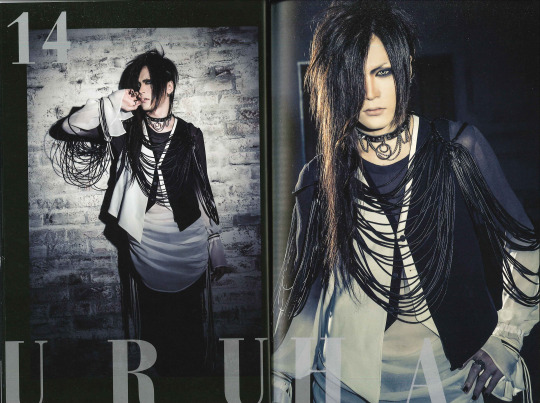


Interviewer: Some time has passed since DOGMA was completed. How do you feel about the album now?
Uruha: First of all, DOGMA encapsulates everything about the current state of the GazettE. It’s a work that reflects who we are right now. That, combined with how difficult it was to produce, makes it the album I’m most emotionally attached to. The process was so challenging it almost felt cursed (laughs). While the recording itself went relatively smoothly, there’s so much more involved in creating the package—the cover art, the contents, the music videos, and so on. The amount of effort it took was just insane.
Interviewer: That’s surprising. With such a clear concept like “DOGMA,” I thought it would have been straightforward.
Uruha: When we, as a visual kei band, try to express something like DOGMA, if we approach it half-heartedly, it ends up looking really uncool. There’s a danger in leaning too much into the familiar territory of the GazettE and making something overly predictable. Imagine: we release something after two years of work, something that’s supposed to be right up our alley, and the reaction is, “That’s it? This is all they’ve got?” That would be the end for us.
In the past, we’ve taken various elements, broken them down in our own way, and created something that felt fresh and intriguing. Those works were often ambiguous enough to be interpreted in different ways. But this time, with DOGMA, we focused on the very core of visual kei. And because of that, there was no room for compromise. Anything less would’ve felt lame. Even with the PV, if the impact and flow of each image doesn't hit you hard, it won't leave an impression at all. That’s why we poured so much energy into it.
Interviewer: With your long career and track record, I think audiences might forgive you even if you leaned into safer or more predictable ideas. But it’s clear your band refuses to settle for that.
Uruha: Exactly. We want to feel excited about what we’re creating first and foremost. Even if we released something casually and people praised it with, “As expected of the GazettE,” if we didn’t feel the thrill ourselves, it would be hollow. We can’t be satisfied just with external reactions. That’s why we’ve reached the point where leaving things like music videos entirely in the hands of a director no longer works for us. When we did that before, the final product often left us feeling dissatisfied. So now, we, the members, are directly involved in every single process.
Interviewer: That said, taking part in every aspect of the project must have placed a huge burden on the band members, right?
Uruha: Yeah, it was no joke. The workload was insane. For the PVs, we had very little time—only one or two days booked at the studio. We often worked straight through the night until midday the next day. It felt like going back to the old days (laughs). It was really tough.
Interviewer: Even so, I think listeners will be thrilled to know that the members took such responsibility for every aspect of the work.
Uruha: I believe that if we present something we’re satisfied with, the people who experience it will feel satisfied too. Through that synergy, we can keep creating better and better things. That said, while DOGMA is a project we poured so much into and feel deeply attached to, looking back now with a bit of distance, we can see some points for improvement. DOGMA is one particular approach, and for the singles we’ve been working on since, we’ve tried to take a different approach, using lessons learned from DOGMA.
Interviewer: So the new single UGLY was released shortly after DOGMA. Did it involve reworking any leftover tracks from the album?
Uruha: Not at all. All three tracks are brand-new. After making 13 songs for the album, we turned around and made three more new songs. And we only had one week to compose them—we squeezed every last bit of creativity out of ourselves (laughs). We had already decided before the album’s production began that we’d release a single right after it. In hindsight, that scheduling decision was a mistake (laughs). Combining album and single production just wasn’t feasible. The album had 13 brand-new songs, so we focused all our energy on that. Then once it was done, we geared up to give our all for the single as well.
Interviewer: The GazettE’s all-or-nothing approach is impressive as always. So, for this single, you started production without any demo stock from the members, right?
Uruha: Yes. Since we were so pressed for time, we only had one song selection meeting—maybe two if we were lucky. But we were already thinking that having a second meeting might be unrealistic. When we brought our songs together, UGLY and GODDESS were decided on almost immediately. But after that, while we had plenty of material, we couldn’t settle on a third track for quite some time. Finally, just before recording started, RUKI brought in DEPRAVITY, and the lineup was complete.
Interviewer: It sounds like the selection process was quite rigorous. Did you decide on UGLY as the title track during the first selection meeting?
Uruha: Yes, we did. After DOGMA was completed, we started brainstorming ideas for the next single. RUKI had already begun casually sharing his vision for the PV, saying he wanted it to include an audience and feel like a live performance. With that in mind, the song needed to be a high-energy, live-oriented track, with a theme centered on anger. I could sense that RUKI was ready to take the lead on creating the main track, so I thought I'd leave it to him. That mindset led me to focus on bringing something different, more experimental, as my contribution. As expected, RUKI presented UGLY at the selection meeting, and it was such a perfect fit that we decided to make it the title track.
Interviewer: UGLY carries on the essence of DOGMA while bringing a different flavor with its bold use of loops. It feels distinct from the band-oriented sound of DOGMA.
Uruha: But it didn't feel strange to me. I often use loops or experiment with SE elements, and the loop in UGLY has more of a breakbeat vibe. If we had added edgier synths or leaned harder into that direction, it might’ve felt different. But that’s not what we did, so to me, it still has the analog sound of a band.
Interviewer: As a band with deep experience in electronic elements, you struck a perfect balance. How about the guitar parts in UGLY?
Uruha: They’re very simple. Much like the tracks on DOGMA, this one continues the trend of simplicity. There isn’t much that’s tricky or effect-heavy anymore. Some people, particularly those from a metal background, might listen to this and think, This isn’t metal. But we’ve carried over a metal-inspired mindset since DOGMA. That consistent, intense energy is what defines the sound, and UGLY embodies that as well.
Interviewer: It seems like you’re focusing on creating something simple yet cool.
Uruha: That’s the method that fits best with our current style. Complicated techniques or rich, flamboyant playing just don’t suit our recent tracks.
Interviewer: Do you ever feel frustrated sticking to simple playing?
Uruha: Initially, I did. My entry point as a guitarist was LUNA SEA, and SUGIZO’s richly varied guitar playing formed the foundation of my approach. I’ve always found joy and excitement in expressing myself through diverse techniques and tones. But now, by diving deeply into this simpler, harder, and more aggressive style, I’ve found challenges of a completely different kind. When it comes to tone, for example, I have to be incredibly meticulous to achieve the sound I envision. It’s demanding, but it’s also fascinating.
Also, this style of twin-guitar playing brings its own unique challenges. Some bands take shortcuts by having one guitarist record both parts of unison to ensure perfect synchronization. That approach is quick and easy, but it results in identical nuances, which can feel dull. Instead, what we aim for is something where the timing and groove align perfectly, yet the two guitars retain distinct nuances.
Interviewer: I think that's how both "DOGMA" and this release turned out.
Uruha: Really? It’s getting harder as we grow older. When you have two established players with their own distinct styles, it becomes incredibly difficult to align those preferences and work toward a singular vision. It’s like two strong-willed painters trying to create one painting together. There’s always the desire to showcase your own style, but for this kind of collaboration, you have to suppress that and create something new and unrecognizable as the work of either individual. That’s the kind of work we’re engaging in right now.
Interviewer: It requires a disciplined mindset and a high level of skill. In "UGLY," you also have a guitar solo. How was that process?
Uruha: When we decided to include a guitar solo, I thought the section was fairly long. I initially came up with a solo that spanned the entire range, from high to low. But it seemed to lack dynamics, so RUKI told me, to make it more emo.
I was like, What does 'emo' even mean? (laughs). He also mentioned he wanted tapping to run in the background of the chorus, but I thought it would be way too noisy. I told him, You’re just going to complain about it later! (laughs). So, I decided to incorporate tapping at the start of the solo instead.
The original plan for the solo was to start simply, then add harmonies and build intensity toward a dramatic finish. However, since the solo transitions back into the loop and drops in energy, ending it with a big, dramatic climax felt out of place. That’s why I wrapped up the harmonized parts at the right moment and used a wah pedal to smoothly connect to the sequence.
Interviewer: It sounds like the solo tells its own story. "DEPRAVITY," on the other hand, is an aggressive track with a melodic chorus.
Uruha: This was the elusive third song that took the longest to finalize. The demo came in just two days before the recording session. We had one day in the studio to work on it, and then we immediately recorded it—a situation we’d never experienced before (laughs).The track is simpler than "UGLY," likely because RUKI, given the tight timeframe, intentionally kept it straightforward. But while simple, it’s incredibly cool. I’m honestly impressed that such a great track was created in such a short time.
The guitar part involves a six-string riff played continuously, which I think will be quite demanding live. For non-musicians, this might be hard to understand, but playing the same thing over and over is physically exhausting. It reflects an idea that probably only someone who isn’t a guitarist could come up with. Guitarists tend to want to change things up or develop the riff further, so this kind of looping riff is rare. Still, this kind of repetitive approach is very effective in leaving a lasting impression on listeners.
Interviewer: It’s interesting how the guitar assumes a sequencing role in this track. And, of course, your emotional guitar solo stands out.
Uruha: Since the solo in "UGLY" managed to incorporate dynamic shifts, I wanted a different flavor for "DEPRAVITY." Compared to the trickiness of the first track’s solo, this one focuses on a sense of momentum, aiming to run through the song. While recording, I was coming up with ideas for the solo, and even on my way home, I kept playing the backing track for the solo section in the car, searching for different melodies. Later, I translated those ideas into the guitar part. As a result, I feel like I’ve created a guitar solo with melodies that really stick with me.
Interviewer: Even as your musical style evolves, your identity as a lead guitarist remains consistent.
Uruha: That’s something I always hold on to. However, I don’t believe every track needs a guitar solo. If a solo is necessary for the song, I’ll put in as much effort as possible. When we decide that a part of a song will feature a solo, it’s never about saying, “I’ll take this solo” or “Aoi should play here.” Instead, I take the idea home, do everything I can with it, and bring it back. If Aoi has also prepared something, we then discuss which one fits better. In other words, whether or not my solo ends up in the final version, I always give it my all. Even if what I create doesn’t make it to the track, the effort still adds to my growth as a guitarist.
Interviewer: I hope you’ll continue with that approach. Let’s move on to "GODDESS."
Uruha: “GODDESS” is a track Aoi brought and honestly, it’s all about that intro guitar phrase. The moment we heard it, everyone went, Whoa, that's so cool!! (laughs). I thought it's so unmistakably Aoi. It’s like he combined the nostalgia of '90s J-pop with his unique emotionality. Not in a sentimental way, but more like he has taken something he loved from the past and refined it into his own expression.
Interviewer: “GODDESS” is both classy and powerful. It feels like new ground for the band.
Uruha: It’s true. The A section is emotional, but the B section has this raw, gritty feel to it, and the chorus has a different kind of weight altogether. Each section has a very distinct tone, and the overall tension doesn’t remain constant throughout. That’s also Aoi’s individuality.
If it were up to me, I’d likely carry the emotional tone of the A-section throughout the entire track because that kind of vibe feels so satisfying to me. But that’s not what happens here. The result is a song that doesn’t neatly fall into being either soft and emotional or purely a hard tune—it lands in this interesting middle ground.
Interviewer: That's true. What did you pay attention to with the guitar in this song?
Uruha: With Aoi’s songs, I don’t feel the need to add tricky elements. I tend to prioritize not disrupting the vision he has in mind. I try not to impose too much of myself onto it, focusing instead on deepening the world he’s creating. For “GODDESS,” from the first listen, the A section stood out as the emotional core for me. It’s very simple yet ambient, and Aoi’s guitar alone was quite enough. So for me, the challenge was figuring out how to complement it.
The solution came from the ambient quality I first felt in the A section. So I decided to focus on creating depth. Aoi’s guitar already expressed that laid-back feeling, so I added arpeggios with heavy reverb. The goal wasn’t to make the arpeggios themselves stand out, but to let the reverb carry the ambient quality. I cranked up the reverb to an extent you wouldn’t normally hear in typical backing parts. I also positioned my guitar in the center of the mix, with Aoi’s backing spread out to the left and right. That's the technique that's being used.
Interviewer: Since “DOGMA,” the band has leaned into a more aggressive and solid sound, but you can still shift to this kind of approach seamlessly when a track calls for it.
Uruha: That ability comes from all the experience we’ve built up over the years. No matter what mode the band is in at the time, approaches like this come naturally when needed.
Interviewer: Impressive. “UGLY” is a must-listen track that showcases the GazettE moving beyond “DOGMA.”
Uruha: Especially with “GODDESS,” I feel we were able to express things we couldn’t on “DOGMA.” Also, despite having so little time, there wasn’t a single compromise made on this single. I can confidently say that.
Interviewer: That’s evident when listening to the music. Now, the GazettE is currently in the rehearsal stage for the “DOGMA” tour.
Uruha: Since we went straight into single production right after recording the album, we had no time to practice the album tracks. Personally, I only managed to get about two solid days of intense practice. By the second day, I was feeling pretty frustrated (laughs). Especially with PARALYSIS. The other songs were fine, but the one I had written, PARALYSIS, really gave me a hard time, so I just kept practicing it over and over.
Interviewer: You struggled with your own creation (laughs). What direction will this live show take?
Uruha: From what we’ve decided so far, the focus isn’t just on the stage but on crafting an atmosphere for the entire venue. I want people to feel immersed in the world of “DOGMA” from the moment they step into the venue. Instead of building an elaborate stage set, we’re aiming for a different approach to create that kind of space. When you go for intricate stage setups, there are always some songs that don’t quite match the backdrop. On the other hand, if there’s nothing at all, it’s harder to set the mood. So, we’re currently experimenting and trying to find the right balance.
As for the flow of the live show itself, it’s going to be intense and relentless, with no ‘quiet sections.’ If someone listens to "DOGMA" and then comes to the show expecting a theatrical experience, I think they’d be disappointed. While the venue will reflect the world of “DOGMA,” once the show starts, it’s all about the power and unity of the band’s sound. I believe that’s the right approach, and we’re excited to show this evolved version of the GazettE.
Interviewer: The tour sounds incredibly exciting. The GazettE seems to have become a unique and solitary presence. How do you perceive your position within the music scene?
Uruha: First of all, we remain committed to being a visual kei band, but we don’t pay much attention to the current visual kei scene. What we value are the things that originally inspired us and gave us the idea of what visual kei should be. The current state of the visual kei scene doesn’t interest us.
Also few years ago, we were focused on expanding our presence outward, but now, we’ve shifted to narrowing our focus. We decided to first acknowledge where we currently stand. We know that if we’re not creating something truly engaging, people won’t stay interested. So instead of trying to reach outwards, we’ve turned inward. In that sense, "DOGMA" felt like a return to our roots. Lately I feel like the band itself has come full circle.
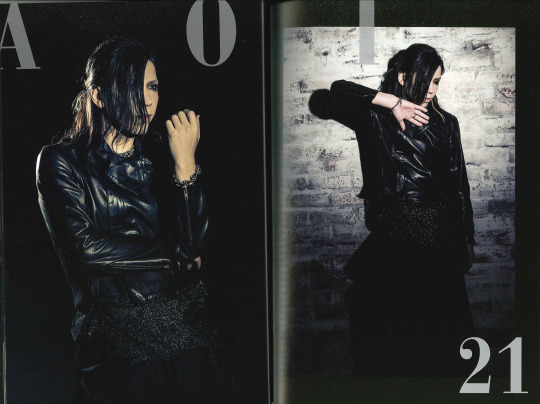

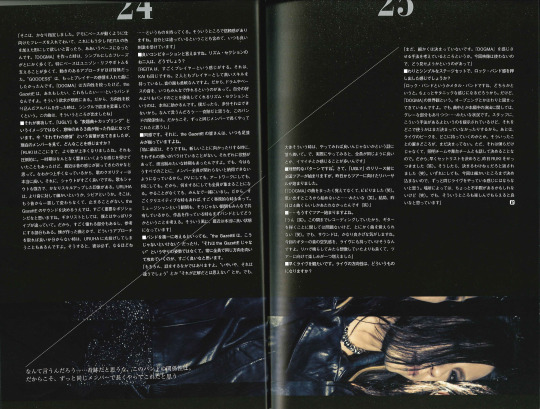
Interviewer: It has been some time since "DOGMA" was completed. How do you feel about the work now?
Aoi: The impression I have now is that we accomplished one definitive form as a band. To continue growing from here, I feel like we need to explore different approaches. But at the point when we created that album, I feel like we did everything we could. That’s the impression I have.
Interviewer: Does that mean you already have a vision for what’s next?
Aoi: Yes, I do. "DOGMA" was relatively straightforward in its approach. The guitar and bass parts weren’t overly complicated; the focus was more on the ensemble sound of the band. I think moving forward, we can make the band even more appealing by highlighting each member’s unique strengths a bit more. That’s something I’d like to focus on in the future.
Interviewer: "DOGMA" aimed to return to the band’s roots, and in such cases, the emphasis tends to be on the overall band’s identity rather than individual members’ personalities.
Aoi: Exactly. When you have a concept like "DOGMA," it limits how much you can stray creatively. When you try to solidify a particular worldview, you end up stripping away the decorative elements. That’s how "DOGMA" was made—it was a specific methodology. But if we continued doing it this way, I feel like the band would stagnate. This time, the concept was about shaping the word “DOGMA,” so I don’t think it was the wrong choice. But moving forward, I want to assess the best approach for each project as it comes.
Interviewer: As you said earlier, it feels like the experience of pushing yourselves to the limit with “DOGMA” allowed you to gain new insights. The new single “UGLY” surprised me with its fresh direction.
Aoi: With the short gap between the album and the single, people might think we were working on both simultaneously, but that’s not the case. The three songs on "UGLY" were created after we finished recording the album. That’s why producing this single was incredibly tough. We only had about a week to work on writing the songs. I was writing songs while thinking, “I’ve got no more songs left in me!” (laughs)
Interviewer: Creating three songs in a week is impressive. Was there a specific theme in mind for the new single?
Aoi: At first, we talked about building on the flow of "DOGMA," including solidifying the worldview we’d established during the tour. But it ended up being something quite characteristic of the GazettE (laughs). While it’s not drastically different from "DOGMA," the single shows a different side of us.
Interviewer: For example, the title track "UGLY" is different from "DOGMA" in that it makes bold use of loops, which surprised me.
Aoi: Exactly—it’s like the loop swoops in and turns everything on its head (laughs). From the demo stage that RUKI brought in, "UGLY" was already structured to integrate loops with live drums. It was so cool that we decided to keep it as is. During our first song selection meeting, "UGLY" and "GODDESS" were finalized right away. So, rather than being restricted by the "DOGMA" world, we approached the selection process with a relatively free mindset.
Interviewer: That sense of freedom really comes through. Did RUKI’s demo include detailed guitar parts as well?
Aoi: Yes, they were pretty much complete, and we used them almost as-is. The guitars in this track are primarily unison, so while there’s nothing particularly groundbreaking, the approach is tailored to suit the song.
Interviewer: That said, don’t you think the guitar tone has evolved from "DOGMA"? The sound feels less distorted yet still powerful, with an added clarity compared to the album.
Aoi: You noticed that, huh? (laughs) Before, we used boosters or DI (direct boxes) in front of the amp, which added certain characteristics to the sound. This time, we didn’t use those and went directly into the amp. That’s what gave it the texture you’re describing. It’s harder to play and less forgiving, but when you feel it’s a good sound, you want to record with it. That motivation helps you get past the difficulty of playing it.
Interviewer: That sounds very much like you, Aoi. Next, let’s talk about “DEPRAVITY.”
Aoi: As I said earlier, “UGLY” and “GODDESS” were finalized during the first song selection meeting, but we couldn’t decide on the last track. It was already time to start recording, and at the last moment, RUKI brought this song in. It felt like we had been waiting for it. A really cool track came through right on the edge, and I thought, “Yes, this is it!” Once it arrived, it was like, “Let’s start cooking immediately!” (laughs)
Interviewer: So, does that mean the guitar parts for “DEPRAVITY” were also kept close to the demo?
Aoi: Yes. RUKI’s demos are always well-crafted, so there’s generally no need to change much. Also, if I do make changes, RUKI just asks me to revert them (laughs).
Interviewer: I see (laughs). While this release shows new elements, “UGLY” and “DEPRAVITY” share some similarities with the songs on “DOGMA” in terms of having many parts in their compositions.
Aoi: That’s true. Actually, that style was more common in the older the GazettE songs. Back then, it was harder to memorize the tracks. But recently, the structures have been more straightforward, so it’s been easier. That said, it seems like things have come full circle. This is probably the mode RUKI is in right now.
Even though "UGLY" and "DEPRAVITY" have many parts, they’re clear and easy to listen to. When we make songs, it’s not about trying to be calculated. It’s more about whether something feels good or not. While we don’t intentionally aim for it, this time, the results turned out the way they did. For example, with "DOGMA," we deliberately avoided repeating the same patterns, but our general approach is to naturally align ourselves with what the song requires.
Interviewer: When you listen to the demo and notice it has a lot of sections, do discussions about cutting them down ever come up?
Aoi: Not really. In the past, we might have said something like, “This section is too long; let’s shorten it.” But ultimately, as long as the song doesn’t feel difficult to grasp, it’s fine. The key is for each part to make a strong impression and for the transitions between sections to feel satisfying. Whether it’s the songs on “DOGMA” or these two new tracks, I think we’ve been able to achieve that.
Interviewer: That’s true; nothing feels unnatural. Even with the numerous parts, the songs aren’t overly long.
Aoi: That’s something we’ve grown into, I think. In the past, even our intense songs would be around five minutes, and we’d be like, “Wow, this is long… really long” (laughs). It was a challenge back then. Through that experience, we’ve learned to keep things compact even with complex structures. Simply stringing ideas together is relatively easy—you just keep adding parts. But to consolidate those parts into a cohesive song without it feeling awkward or overly long requires composition skills and a good sense of balance. I think the GazettE has really strengthened those aspects as a band.
Interviewer: You can really hear that in “DOGMA” and “UGLY.” And the third track on the single is "GODDESS," written by you, Aoi.
Aoi: Even with the tight schedule, I was half giving up when I managed to come up with this track (laughs). For "DOGMA," I kept playing the guitar despite thinking, ‘I’ve got nothing,’ and somehow squeezed out ideas. This time, I was strumming the guitar, thinking that I couldn't do it, and the intro melody for the guitar suddenly came to me.
That became the starting point for the song, but I didn’t have time to refine the details. The demo I showed everyone was extremely basic, just the intro guitar melody layered over some backing tracks. But it seemed like they got the worldview, and we immediately decided to do it.
This track feels like a reaction to what I couldn’t do during “DOGMA.” "DOGMA" had a very clear concept, leaving no room for something like this. “GRUDGE” is on the album, but when I listen to it now, it feels like I was struggling. "GODDESS," on the other hand, feels like it expresses my personality much more directly.
Interviewer: In your unique way, Aoi-san, you've blended melancholy and strength, creating something entirely new. The intro guitar melody that started it all is very striking and has exquisite nuance.
Aoi: The intro uses arm vibrato. When we were stuck editing the "DOGMA" music video, everyone was stressing out, wondering what to do. During that time, I was the only one online shopping (laughs). I came across a guitar with an arm unit I’d never seen before. While everyone else was agonizing in the early hours of the morning, I was clicking the ‘Buy’ button (laughs). That arm unit turned out to be incredible, it’s got this almost erotic quality to its effect (laughs). If I hadn’t bought that guitar back then, I don’t think this song would have been born.
Interviewer: So, in a way, even though it wasn’t directly related to editing the PV, you still ended up contributing to the band (laughs). The floating sensation transitioning from the intro to the verse is striking. Was that achieved through a key change?
Aoi: Hmm… is it a key change? I’m not sure (laughs). I always compose based on intuition rather than logic. Initially, the transition into the verse was more straightforward, but somehow, it ended up like that. I think I probably made a mistake while playing and liked how it sounded, so I decided to keep it. That’s why I can’t really explain the theory behind it (laughs). The B-melody also gets called unique. It has a breakdown-like riff, but it doesn’t have a sharp edge. Honestly, I wasn’t thinking about it at all. This song feels more like something that emerged from me rather than something that I created (laughs).
Interviewer: Your instincts are incredibly sharp. Did you also come up with the vocal melody?
Aoi: I had an image in mind for the melody, but I can’t sing, and it wasn’t the kind of thing I could easily program with a keyboard. So, I explained to RUKI verbally what kind of feel I was aiming for. When I heard the melody RUKI came up with, it blew me away. I thought, ‘Wow, he’s using such niche intervals’ (laughs). He introduced some incredibly tense notes against the basic chord progression, especially in the B section. Even Uruha said, “Wait, isn’t this off-key?”. But when we analyzed it carefully, everything was perfectly aligned. It made me appreciate once again how amazing RUKI is. The melody in the chorus, in particular, is exceptional. I had inputted a rough draft of the chorus melody, which RUKI then arranged into its current form. It was the same with ‘GRUDGE’; RUKI added such fantastic melodies, and I’m really grateful for that.
Interviewer: RUKI really excels at melancholic melodies, doesn’t he? How did you approach creating the guitar parts for ‘GODDESS’?
Aoi: For this track, I felt the key was to keep the guitar emotional throughout. Instead of showcasing flashy or tricky guitar work, I focused on evoking emotion. While we did use twin-guitar arrangements, it wasn’t something I planned meticulously. I started with parts I wanted to play and then passed them to URUHA, who added a lot of great elements. The A section and the chorus were significantly transformed by him. Speaking of the chorus, there’s that little guitar phrase that sneaks in between the vocal lines, right? At first, I thought about playing that kind of guitar throughout the entire chorus. But when I recorded it, RUKI rushed in from another room saying, “No, no, no!” (laughs) So I asked, “Can I at least play it here?” and managed to sneak it into just that one section (laughs).
Interviewer: It turned out to be a great hook. The bassline in the chorus of ‘GODDESS’ is also very striking, with its low, groovy presence.
Aoi: That part was quite deliberate. I included a phrase in the demo that encouraged a more active bassline and told REITA to incorporate his own style into it, which resulted in what you hear now. When we worked on "DOGMA," many of the basslines were very simplified. The bass mostly focused on unison riffs or supporting the low end, with hardly any dynamic movement. For “GODDESS,” I wanted to create a song where the player’s emotions could shine through more.
The album “DOGMA” was very focused, but the GazettE as a band always has this underlying desire to do a little bit of everything. When we make an album with a focused direction, singles often become a way to unleash those desires. I think this song reflects that side of us.
Interviewer: That approach has worked well, turning “UGLY” into a meaningful work of three interconnected songs, rather than just a title track with supporting B-sides. You mentioned individual emotions earlier—what do you feel when you look at the members currently?
Aoi: RUKI has significantly improved his singing recently—it’s really powerful. There was a time when I felt like he was forcing it a bit, but lately, it seems like his natural essence has returned. On top of that, his technique has improved, so the overall quality of his performance is incredibly high. His singing is powerful, his shouts are also amazing. I think he’s made significant progress in his craft.
As for Uruha, he’s as meticulous and critical as ever when it comes to quality. He's always been like that. I think his role is crucial in defining the GazettE’s sound. As a guitarist, his style is very different from mine. I admire him and often learn from him. Sometimes, when I’m unsure about how to approach a particular part, I’ll leave it entirely to Uruha. Without fail, he comes back with ideas that make me go, ‘Ah, I see… that’s brilliant.’ I trust him completely in that regard. It’s because he’s so different from me that I always find his work inspiring.
Interviewer: It sounds like a strong partnership. What about the rhythm section?
Aoi: REITA gives off the impression of being a true player, and the same goes for Kai. Both of them possess incredible skill and are flexible when it comes to their sound. This allows us to work together as a band to shape the drums and bass. It’s incredibly helpful to have a rhythm section that prioritizes the band’s needs over their personal preferences. I don’t think I could do that myself. How can I put it… our band’s relationship feels almost miraculous. I think that’s why we’ve been able to stay together with the same members for so long.
Interviewer: I agree. The members of the GazettE always seem to be on the same page.
Aoi: Especially recently, that’s true. When we head toward something new, there’s no sense of anyone being out of sync. Everyone has their role, and there was a time when responsibilities were more divided. But now, we’ve reached a point where none of us are satisfied unless all members are involved in everything. Whether it’s the music videos, the artwork, or anything else, we all have to come together. Even if there’s nothing specific to do, we’re always together. Sometimes that leads to highly creative moments, while other times it’s more administrative. We share moments of being musicians and moments of being something else entirely. That’s why, when we’re creating a piece, we first consider what’s best for the band as a whole. Recently, I think we’re in a really good state.
Interviewer: It’s impressive that even though you prioritize the band, it’s not from a defensive mindset like “the GazettE has to be this way” or “that’s not GazettE.” Instead, you’re always attacking as a unified group.
Aoi: Of course, there are times when such conversations happen. Like, “No, no, that’s not it” or “I can’t agree that this is the right way.” But usually, it ends with, “Well, why don’t we just try it?” And when we do, most of the time we all feel the same about it afterward—whether it’s good or not so great.
Interviewer: That’s an ideal dynamic. Moving on, the nationwide tour begins before the release of “UGLY,” and I hear rehearsals for the tour just started yesterday.
Aoi: I realized I didn’t remember any of the songs from DOGMA, and it freaked me out (laughs). It was like, “I need to start by remembering them…” (laughs). In the end, we only managed to go through about four songs yesterday (laughs).
Interviewer: ...But the tour starts soon, right?
Aoi: Yeah (laughs). We just finished recording recently, so there’s no issue with my guitar-playing itself. But remembering the songs? That’s another story (laughs). That said, I think the sound is shaping up really well. It feels like we’ll be able to bring the atmosphere of the guitar tones from the recordings to the live performances. When we tried it out during rehearsals, it sounded even better than I’d imagined, so now I’m even more excited for the tour.
Interviewer: I can’t wait to see the live shows. What direction are you aiming for with this tour?
Aoi: We haven’t decided on the details yet. We’re currently thinking about ways to reflect the essence of “DOGMA.” This time, we’re not using any video visuals, so we’re figuring out how to deliver the experience effectively without them.
Interviewer: Will it be a relatively simple stage setup that emphasizes the rock band feel?
Aoi: I'd say it’s more metal, rather than rock. It’ll have a bit of a satanic feel to it. But it’s the worldview of “DOGMA”. The opening sequence is pretty much set. However, when it comes to the performances during the songs or the main part of the show, there are still some gray areas.
The staff have presented us with various methods we could use, but we haven’t decided where and how to incorporate them. There’s also the matter of figuring out where the live show’s peak should be. These kinds of decisions aren’t just up to us; they involve discussions with the lighting and stage teams as well. Yesterday, I was urging RUKI to finalize the setlist already (laughs). And his response was, “It's not like I can just pull it out of thin air!” (laughs).
That said, we’re intentionally leaving room for flexibility this time, so it won’t feel like we’re doing the exact same show every night. There might be some slip-ups depending on the location (laughs). But I hope the audience can enjoy those moments as part of the experience too.



Interviewer: This interview is taking place in the studio during your tour rehearsals. With the album and single recordings behind you, it seems the tour has crept up quickly. Looking back, what has this time been like for you?
Reita: Honestly, I just wanted the album to come out as soon as possible. There was so much preparation required before its release, and I kept thinking how much easier it would be once it was out. The process to get everything ready was so extensive that I was really just looking forward to the relief of finally releasing it. Especially August—it was brutal (laughs). But now that the album is out, there’s already the next thing to work on, so it’s not like I can fully relax yet. Just the other day, we had the shoot for the UGLY music video. In the past, we had fans in the video for Hyena, but the crowd wasn’t that large, and we had extras as well. This time, we exclusively invited fans, and we managed to capture a very live-like atmosphere.
Interviewer: That’s such a fitting scenario for a rock band. How did it feel to film it?
Reita: Well, in the DOGMA music video, I didn’t even have my bass with me (laughs). So I guess you could say this was a reaction to that. It was fun! Even though it’s a PV shoot, you’re surrounded by fans and playing your instrument, so it finally hit me—Oh, yeah, I’m in a band. Up until then, I was kind of like, Wait, what do I even do? (laughs). So yeah, it was a good reminder that I’m actually in a band.
Interviewer: Did the shoot go smoothly?
Reita: The performance scenes with the fans went really smoothly. Obviously, we couldn’t shoot until late into the night (laughs). We wanted to capture a sense of unity with the fans, and since they all volunteered to be there themselves, they really got the hang of things quickly. It all came together in no time. When it wasn’t a performance scene, the fans had this warm vibe, which made things so much easier. And then, when the music started, they instantly switched to being completely serious—that transition was incredible.
Interviewer: That’s wonderful. I’m sure the fans were thrilled. Opportunities to connect with the GazettE outside of live shows are pretty rare, after all.
Reita: Right. And this time, the distance between us and the fans was really close. The people in the front row were just about a meter away from us.
Interviewer: Really? That’s so close!
Reita: I wonder if it was tough for them being that close.
Interviewer: It must have been nerve-wracking for them.
Reita: I mean, maybe they thought, ‘Oh, he’s not as impressive up close’ (laughs).
Interviewer: That’s not true! Stop it (laughs).
Reita: (Laughs) But, honestly, what followed was pretty grueling...
Interviewer: I heard you wrapped up at dawn.
Reita: It’s always dawn, isn’t it? (laughs). And then, a week later, we had another shoot with extras that started at 7 a.m. and went on until 5 a.m. the next day (laughs). That one was brutal, but we managed to get some great footage out of it.
Interviewer: Now, about the single UGLY. Including “DEPRAVITY,” it’s such an intense release. It feels very much like the GazettE to put out a single that defies the usual expectations of what a single should be.
Reita: While performing DOGMA songs in the main set during the tour, we started thinking about what kind of tracks we still needed, and that’s how we ended up with something this heavy. Plus, trying to make something “single-like” often ends up being a flop or just feeling lame (laughs). So, we wanted something that would hit hard, continuing the momentum from DOGMA. And to be honest, I’ve never really liked singles much (laughs). This one was really created with live shows in mind, and it’s definitely a track I can’t wait to perform live.
Interviewer: UGLY feels like it’s destined to become a regular part of your setlist.
Reita: Yeah, especially since we included fans in the PV. It makes me want to see that kind of energy from the stage during live shows too. The video kind of set a guideline for how it could play out. Whether fans replicate that vibe is up to them (laughs), but once they see the video, they’ll get it. Even in the DOGMA preview, we included snippets of older live footage to hint at how fans could engage. It’s like, ‘Maybe you could go wild here?’—we’ve already planted that idea (laughs). At this point, I really want to amplify the power and energy of our live performances even more.
Interviewer: The rhythm and BPM of UGLY definitely feel like they’re right in line with the core of the GazettE’s live vibe. As a bassist, is this a style that comes naturally to you?
Reita: The groove itself is straightforward, but the picking style isn’t something that comes naturally to me—it was actually surprisingly tricky. For this song, I ended up playing it fingerstyle. Initially, I played it with a pick, but for some reason, the groove wasn’t quite right. Then I realized it felt more natural when I played it with my fingers.
Interviewer: That’s surprising! You’d think picking would provide more attack and suit the song better.
Reita: Right. I was more used to using a pick, so it should’ve been easier for me. During pre-production, I initially played UGLY and DEPRAVITY with a pick and GODDESS fingerstyle. But later, I decided to redo UGLY and DEPRAVITY fingerstyle as well (laughs).
Interviewer: Really? So, does that mean you recorded all the tracks fingerstyle this time?
Reita: In the end, GODDESS ended up being the only track I played with a pick (laughs).
Interviewer: That’s the complete opposite (laughs). You’d think GODDESS would suit fingerstyle the most.
Reita: I know (laughs). But in terms of the overall sound direction, that’s how it worked out.
Interviewer: You’re widely associated with playing with a pick. Are your preferences starting to shift?
Reita: Well, I simply wanted to practice fingerstyle, so I’ve been playing songs where it feels like it fits. But ultimately, I think I’ll return to using a pick for everything. It’s more like I just want to go through the process of mastering fingerstyle for now.
Interviewer: So, is this exploration part of a broader desire to refine your identity as a bassist?
Reita: Definitely. But it’s made the bass more challenging day by day—whether it’s crafting the sound, coming up with the playing style, or even just constructing the phrasing. Still, bass is inherently a very free instrument. It doesn’t have a long history, and there shouldn’t be any rigid rules around it. Yet, I’ve built up these internal rules for myself, which have actually limited my creative possibilities. I’ve developed this narrow aesthetic of what my bass playing should be like, and breaking out of that mindset has been tough. That’s something I’m still working on.
Interviewer: So, in a way, you’d unintentionally confined yourself, but now you’re breaking free from those limits. It’s intriguing to see your approach as a bassist evolving so aggressively at this stage.
Reita: Right (laughs). But to be honest, I’ve always been thinking about what my bass style should be. Even now, I haven’t arrived at a definitive answer. Like I mentioned earlier, I’m still in the middle of experimenting and figuring things out.
Interviewer: “UGLY” is already aggressive, but the relentless drive of “DEPRAVITY” seems to epitomize the flow of DOGMA. The fast-paced beat of the song feels like it would be right up your alley.
Reita: That’s true (laughs). Honestly, I’d love to walk on stage without any intro SE and just start with this song right away. The tempo and feel really hit my sweet spot. When I imagine what it might look like in a live DVD, I picture myself really digging in with a pick—but in the end, I ended up playing this one fingerstyle too. That will probably make for a slightly different performance vibe on stage.
Interviewer: Seeing you fingerpick such a fast-paced song will definitely be interesting. Plus, both "UGLY" and "DEPRAVITY" have those shout-along choruses, which make it easy to imagine how they’ll play out live.
Reita: Haha, right? It was the same for DOGMA—we recorded those vocal parts one person at a time. In the past, we used to record them all together, but we realized it’s more fun to do it individually (laughs).
Interviewer: Fun as in the final result, or...?
Reita: Not so much the end result—it started as a way to make mixing easier. But as we went along, the recording process itself turned out to be hilarious. People’s voices cracking or flipping, for example (laughs). It’s usually the last thing we record after the main vocals are done, so the vibe is pretty relaxed by then. It’s hard to stay too serious, and everyone ends up laughing.
Interviewer: By that point, you’ve already gotten over the most intense parts of the process.
Reita: Exactly. By that point, we’ve already crossed the mountain, and people’s voices start giving out, which can be pretty funny (laughs). It’s a nice way to wrap up the recording process on a positive note.
Interviewer: That makes sense (laughs). Maybe it’s a necessary part of the GazettE’s recording process to maintain the right balance.
Reita: Yeah, It creates a really good atmosphere to end things on.
Interviewer: What was your initial impression when Ruki brought in these two intense tracks?
Reita: When the first half of a tour ends and the second half begins, I think some kind of change is necessary. As a band, if we can’t deliver something that takes the vibe of "DOGMA" even higher—something more intense—it’d feel kind of boring. So, these songs came at just the right time. Although "DEPRAVITY" was only finished three days before the first day of recording. We were like, "There’s no time for pre-production!" (laughs).
Interviewer: That tight schedule must have contributed to the straightforward and tense energy of the final product, I imagine.
Reita: I think the simplicity of the structure made it easier to get into the groove. If we’d had more time, we might’ve ended up overthinking it, changing the arrangement, and making it more complex. But because of the limited time, the song stayed simple and easy to follow, which I think worked out for the best. For example, in "DEPRAVITY," after the guitar solo, the bass line shifts just once, and then stays steady throughout the rest of the track.
Interviewer: That kind of simplicity in your playing seems to align with your ideal bass style. On the other hand, Aoi’s track GODDESS stands out with its mid-tempo and melodic focus, and the basslines are particularly prominent.
Reita: Right. It’s a type of song we didn’t have on "DOGMA," but I think it’s the kind of track we need for a long tour. We usually keep pushing hard with heavy tracks, so it’s not like we’re taking a break here, but it does create a distinct atmosphere. It gives the audience a chance to reset their rhythm while maintaining the world we’re building. From a bassist’s perspective, in heavier songs, even if the bass lines are moving, it’s hard for them to have the intended impact or be heard the way you want. With a more relaxed song, the bass comes through more clearly. There’s less unison playing here, so the bass is more dynamic.
Interviewer: Previously, you mentioned that as a bassist, you don’t particularly want to have a lot of movement in your lines, but this track must have been fulfilling to play.
Reita: True. I don’t have a particular desire to play complex, moving basslines, and I don’t think that’s always meaningful (laughs). But when I first listen to a song, I tend to hum a bassline naturally. I avoid starting with the bass guitar because I don’t want to fall back on muscle memory. With GODDESS, there was a line that just naturally fit as I hummed along, so I tried playing it on the bass, and it worked really well.
Interviewer: I see. The fact that you can translate a melody you hum into a bass phrase suggests you’re a bassist with a sense of melody.
Reita: Nah, I don’t have that kind of melodic sense! (laughs) But for intense tracks, I often rely on familiar habits. With heavy songs, if the bass lines are overly complex, it can throw off the groove. Sometimes it’s actually better to lean on muscle memory because it helps maintain the rhythm and feel. For mid-tempo songs, though, there’s more room to explore, and I try to break away from those habitual patterns. But yeah, I don’t have that so-called "melodic sense"! (laughs)
Interviewer: Listening to your bass work on tracks like this, it feels like it diverges a bit from the core style of "DOGMA," but it’s still genuinely captivating.
Reita: Yes. We might see something different by the end of the tour, and when that happens, I think I need to be ready to respond in any style.
Interviewer: When the DOGMA era comes to an end, how do you think you’ll feel? Will you feel like you’ve done it all, or will you want to push even further?
Reita: Or maybe I’ll just feel like disbanding the group! (laughs)
Interviewer: Please refrain from giving us such strange punchlines (laughs). What’s your overall impression of GODDESS?
Reita: When I first heard it, it felt very clear to me. It’s something that wasn’t part of DOGMA at all, but it fits in perfectly where it’s placed. In the intense, dark world of "DOGMA," it felt like a single ray of light broke through. If, instead of "GODDESS," we’d put another intense track in, I think the overall impact would be less powerful.
Interviewer: When everything is too intense, it ends up feeling flat in a way.
Reita: Exactly. If every track is intense, you lose contrast. I think live performances are the same way. You need those peaks and valleys to create impact and sustain energy.
Interviewer: You’ve particularly focused on that balance for this tour, haven’t you?
Reita: Yeah, I don’t think it’s possible to keep everyone at peak intensity for the entire two hours of a show. No one—neither the band nor the audience—has the stamina or focus to sustain that. That’s why having clear peak moments is critical for maintaining the flow.
Interviewer: Back in 2011, you did the conceptually contrasting "ABYSS" and "LUCY" live shows. For example, "LUCY," on the second day, was packed with intense tracks, making it an easy comparison. During rehearsals for this tour, did it feel fundamentally different from those shows?
Reita: With ABYSS, we had a darker mood with song choices that leaned heavily on the emotional core, which really took a toll mentally. LUCY, on the other hand, hit us physically because it was all about intensity. But because it was mostly familiar songs, we were able to keep ourselves mentally steady. This time, though, it’s all new material, so it’s hitting us both physically and mentally (laughs).
Interviewer: That sounds terrifying! (laughs)
Reita: Of course, the content itself is completely different, but in a way, it feels like ABYSS and LUCY are hitting us all at once.
Interviewer: It's definitely both deep and intense.
Reita: Yeah, I’m honestly looking forward to seeing myself completely wrecked (laughs). On the first day of rehearsals, it wasn’t possible to go through all the songs, so we started with about four tracks. Even then, it already felt like this might be the toughest thing we’ve done so far. Honestly, I can’t help but feel a bit worried about what’s ahead… (laughs). But the joy of finally being able to play together as a band again was huge. Up until then, I hadn’t even heard loud sounds for a while. Sure, I’d been practicing at home, but that’s just me on my own. The joy of playing together with everyone really helped me get through the first day of rehearsals (laughs).
Interviewer: You mentioned that completing DOGMA brought back the feeling of when you first started the band. That sense of joy when you all play together must be the same kind of feeling, right?
Reita: Yeah, absolutely. The thing is, we don’t usually get into the studio together except right before recording. Outside of that, it’s a string of pretty monotonous tasks—working late at the office until morning, that kind of thing. But it’s precisely because we have those periods of grinding work that playing together feels so fresh and joyful. On the flip side, if we were constantly playing, I think we’d get sick of it. While the pace of everything so far has been relentless and physically demanding, there’s something about this feeling—it’s like when we first started the band. That initial spark is definitely still there. Maybe it's that 'let's do this!' kind of feeling that helps us overcome everything.
Interviewer: Still, after all those underground efforts, it must feel like "Finally! It's ready!."
Reita: Yeah, it’s like, “We’re finally stepping out into the spotlight.” By the time this interview comes out, plenty of people will have listened to DOGMA, and I’m really curious about everyone’s reactions. Plus, the tour will have already started… I wonder how it’s all going? I hope people send in their impressions as soon as possible (laughs).
Interviewer: Judging by your excitement, I bet you won’t be able to relax even on the release day of DOGMA.
Reita: Hahaha. Honestly, until I hear feedback—good or bad—from the fans, it doesn’t feel real to me. Even when the release day comes, I’m still like, ‘Is it actually out in the world?’ (laughs).
Interviewer: Oh, it’ll be out there, trust me (laughs).
Reita: Whenever we release a CD, either on the release day or the day after, I’ll go to a store—like TSUTAYA or Tower Records—and check out the GazettE section.
Interviewer: Really? Do you peek at people listening to the demo displays?
Reita: Sometimes, if there’s someone taking pictures of the display, I might “accidentally” walk past them (laughs).
Interviewer: You are such a prankster! (laughs)
Reita: (laughs) I mean it, I do check it out every now and then.
Interviewer: Fans should probably keep an eye out for you near release dates. During the DOGMA interviews, you mentioned anger being your biggest source of motivation. It sounds like you’re ready to unleash that emotion live with the new single.
Reita: Oh, this new single is packed with anger, for sure. That’s how much frustration has built up inside me, so I’m really eager to do live shows. You can definitely look forward to it.
Interviewer: It sounds like not having live shows could be just as rough on you mentally and physically.
Reita: Right. Playing live is much better for my mental health. By the way, about the tour—earlier I mentioned rehearsing four songs, but as of today, we haven’t decided on the full setlist yet. We’re still figuring out how to shape the whole thing. This album turned out to be really difficult. It’s tough, but it’s also really cool. Cool things are usually tough, right?
Interviewer: I think that difficulty is what gives it depth.
Reita: Yeah, that’s true. We’ll be experimenting and figuring things out as we go, but I don’t know when we’ll have the final answer. It might not even come after the final show. But what I can say right now is: come to the live shows. The DOGMA world is just beginning. And with this single too, I think it’s ideal to always feel like there’s a something next. That’s what we want to keep doing moving forward. This momentum is going to to blow everything away.
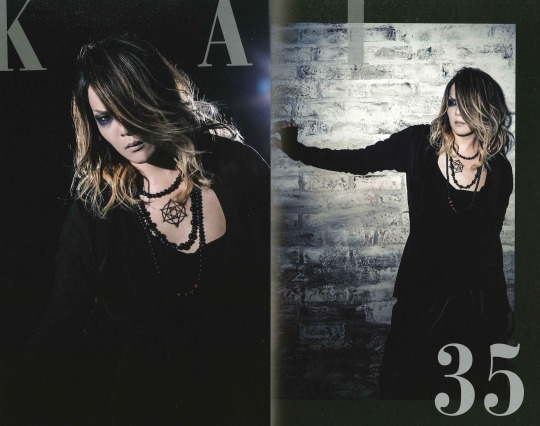


Interviewer: By the time this issue is published, the band will have completed the first three shows of the DOGMATIC -UN- tour. KAI-san, do you feel like, "Finally!" at this point?
Kai: Absolutely. After the first day of rehearsals, my honest reaction was just how purely enjoyable it was. When we’re performing as players, that’s when we as members shine the brightest (laughs). It’s like, "Yes, this is what we’ve been working so hard for!" That feeling really hit me. This is it, you know? Even the struggles feel enjoyable.
Interviewer: If it’s that kind of struggle, then…
Kai: Bring it on! That’s how I feel (laughs). The discussions about how we can improve things, whether to try this or that, are genuinely so much fun. For me, I see myself more as a player than as an artist. I think RUKI is able to balance being both an artist and a player, but for me, I focus on the player side. That’s why I give my all to the behind-the-scenes work, condensing everything for the live performance, where I can fully showcase what I’ve been working toward. It’s like studying for exams (laughs). You work hard for the joy of passing, and it’s a similar feeling to that (laughs).
Interviewer: If we were to compare it, the moment of passing would be completing a live show, but you’re saying you enjoy even the preparation, like the rehearsals.
Kai: Exactly! (laughs).
Interviewer: It’s clear that you absolutely love being in a band.
Kai: Yeah, I’m all about the band. Being a player is something that exists within the band, and playing as part of a band sound with those four other members is what makes it all worthwhile. It’s because of those four that I find so much joy. Playing the drums behind them brings out the most focused and passionate side of me. In the end, I think it’s because I truly love the band that is the GazettE.
Interviewer: It’s amazing that, even after 13 years, you can still say that.
Kai: For us, nothing has really changed since the old days. I mean, we don’t know anything else, so it’s hard to say (laughs). But with the release of DOGMA, honestly, it feels like, 'Finally, it’s starting!'.
Interviewer: The long preparation period must make that feeling even stronger.
Kai: Absolutely. From the very first discussions, we had so many visions, and the challenge was how to align them all cohesively and bring them to life. It wasn’t about adding things on afterward—it all had to be deliberate, and that required a tremendous amount of effort. This is the most conceptual work we’ve ever created in the history of the GazettE. The catalyst for this was the desire to truly emphasize the essence of the GazettE. That’s probably why we’ve been able to approach it so meticulously and thoughtfully. When the essence of the GazettE becomes the theme, it’s crucial to present it with precision. If we can’t do that, there’s no room for growth beyond it—it’s an incredibly important part.
We need to convey what the GazettE is, not only to our core fans but also to those who may not yet know us. If it comes across as vague or subject to interpretation, depending on the viewer, that’s no good. It has to be something clear and definitive—something that makes anyone think, "Oh, so this is what the GazettE is all about!"
Interviewer: The foundation has always been consistent, but since the style presented with each album has been so varied, I imagine that brings even more determination to get it right.
Kai: Take DIVISION, for example. We incorporated electronic rhythms and experimented with blending them into the band sound. The way people interpreted that album was probably very diverse. And since it was a two-disc album with extreme contrasts, there was even a sense of, 'Which one is the GazettE?' For us, it was an album that encompassed both the existing elements of 'the GazettE' and the experimental side we wanted to explore. This time, when presenting what 'the GazettE' is, we felt it was necessary to create a work that could validate everything we’ve done in the past, including the challenges we took on in DIVISION. That’s what DOGMA is.
In other words, DIVISION as a work is grounded on the essence of the GazettE, and we wanted DOGMA to give meaning to that—to define it. To achieve that, we had to create a work that carried enough conviction and persuasive power to tie everything together.
Interviewer: I see. That makes perfect sense.
Kai: We’ve been experimenting with a lot of things for quite some time, but when it comes to 'What’s the true core of the band?'—we’ve never fully showcased that. Listening to DOGMA, you not only understand the essence of the GazettE, but it also allows you to validate our past works.
Interviewer: Following DOGMA is the new single UGLY. How did you feel about the plan to release with such a rapid pace?
Kai: Right from the start, I thought, "This is a good idea!" In the past, singles were often seen as tools to promote the album. But in today’s world, unless a single is extraordinarily conceptual, it doesn’t necessarily serve as a hook for the album. That was the initial thought process.
So, we considered a different approach: basing the singles on the album’s overarching concept and using them to maintain and extend that world for a longer period. That idea felt fresh and exciting. It also aligns with the new flow of how things work in the music world today. Even splitting the tour into two parts stems from this conceptual approach. Positioning the single as an item that expands the world of DOGMA—I was fully on board with that idea.
Interviewer: The title track is a hard tune that is perfect for the GazettE's live shows and is sure to get the audience headbanging.
Kai: Definitely, it’s a killer tune for the GazettE’s live shows. That was something decided from the very start of the songwriting process. The drumming style is something I’m very familiar with, so it was no big deal for me at all (laughs). That familiarity probably made it feel like a killer tune for me, and the recording process itself went really smoothly. I do think it would have been nice to have a bit more time in the preparation stage, though (laughs). As for the title track, my first impression was immediately, ‘This is it!’ It’s a very straightforward song for the GazettE, and there’s really no need to overthink it.
Interviewer: It’s exhilarating to have such intensity in a single, but when I heard DEPRAVITY, my reaction was, “Wow, they’re really going for it!” (laughs).
Kai: Yes (laughs).
Interviewer: "DEPRAVITY" is an even faster-paced track, with a springy, elastic beat that feels both physical and dynamic. I could instantly imagine you drumming to it.
Kai: Yes, yes, yes (laughs). I had the same feeling. When I first heard the song, I could already picture myself playing it, and the phrases were easy to craft. That goes for UGLY as well—there was this sense of, “This is how it should go, right?” and everyone’s response was, “Yes, exactly!” It was all very intuitive and clear (laughs). Of course, we also kept in mind the idea of making something “single-like.” By that, I mean what a single should be for the GazettE—something that represents us. Everyone was very conscious of that.
Interviewer: While DEPRAVITY is fast-paced, the rhythm patterns also have their ups and downs. It’s tightly crafted, balancing momentum with detail, which feels very characteristic of the GazettE.
Kai: True, you could say it does have a variety of patterns. The way we avoid sticking to just one straightforward approach is very much the GazettE’s style. Just when you think it’s going to keep going in a straight line, it doesn’t (laughs). It’s about understanding the potential and flow of the song. For instance, even something as small as leaving out a bass drum kick can affect whether the momentum stops or continues. I kept that in mind to ensure the energy remained unbroken.
As for the phrasing, I’d think, 'Would adding another bass drum kick here make it even better?' and discuss those details with RUKI as we worked through it. By adding elements that weren’t in the original demo, I felt like I was able to increase the complexity without losing the momentum. It all came together in a way that felt satisfying to me.
Interviewer: This might be a simple observation, but your playstyle in this track is intense as always. It seems like the songs are getting even more physically demanding.
Kai: Yeah, you could say that (laughs). But you know, I already expected it to be intense, so it’s no big deal (laughs).
Interviewer: When it comes to showing the essence of the band, does your drumming reflect your natural self—an unfiltered expression of who you are?
Kai: I think if you don’t approach it that way, you can’t really arrive at the GazettE’s core essence. You need to fully express those moments of instinct—those first bursts of inspiration where you think, 'Ah, this is it!'
Interviewer: Of course, there are always challenges in terms of technique or physical demands, but perhaps it’s precisely because of that mindset that tracks like "UGLY" and "DEPRAVITY" came together so smoothly.
Kai: I think that’s exactly right.
Interviewer: That approach must also tie into the enjoyment of playing together as a band. And then there’s "GODDESS," a track that stands out from the others. How did you approach it?
Kai: When Aoi first brought it in, I felt this refreshing quality that I hadn’t really experienced before. But at the same time, it fit perfectly within the framework of DOGMA. It felt so good to listen to, and it was a type of composition I don’t naturally gravitate toward—like the way the chord progression unfolds or the simplicity of the two-chord approach in the verses. That refreshing quality was something completely harmonious with the rest of DOGMA and yet distinctive in its own right.
Interviewer: With this type of track, it seems like drums, much like bass, would lend themselves well to adding expressive nuances.
Kai: That’s true, but the way you manage the tension in this song turned out to be surprisingly tricky. For the softer parts, like the verse, the phrases came to me naturally—I immediately had a sense of what they should be. But balancing that sense of freshness with the heavier, more intense parts, including the opening, was quite challenging. It required a delicate touch.
For instance, in the opening, the original track already had a lot of tom interplay. Given the approach we’d taken throughout DOGMA, we’d been aiming for lower frequencies, capturing tom sounds with an extended low-end resonance. However, if I used that same approach in GODDESS, I felt it might lose the freshness that had struck me initially. So finding that balance—when to lean into the intensity and when to hold back—was a bit of a challenge.
Interviewer: Ah, I see.
Kai: Making it heavy and oppressive would’ve been easy. If the track were structured in a way where the atmosphere shifted abruptly, I could’ve started off with an overwhelmingly heavy tone and then introduced the refreshing quality in the verse. But when I considered the overall feel of the song, that didn’t seem right. The refreshing quality I perceived wasn’t something that could just appear and disappear; it needed to flow throughout the entire track to align with my initial impression. That was a priority for me, and preserving that consistency made it quite a challenge. Simply going for heaviness would’ve made it feel incomplete.
Interviewer: The keyword "refreshing" might initially seem at odds with the world of DOGMA, but your focus on maintaining that feeling seems to be the key to your performance in this track.
Kai: Exactly. From the start, I never saw it as something conflicting with DOGMA. To get more specific, playing the verses or choruses came quite naturally. I felt confident that I could convey myself authentically in those sections. The real challenge was the opening. The opening is such an important gateway to the track—it sets the tone and anchors the listener’s impression. So, figuring out how to present the refreshing quality of the verses and chorus right from the opening became a major task for me. Out of the three tracks, this one gave me the most trouble.
Interviewer: For a refreshing vibe that can exist within the DOGMA framework, it must be more than just a simple sense of lightness, right?
Kai: Exactly. That’s why it was so difficult.
Interviewer: Compared to something physically demanding and aggressive, would you say songs like this take more time and effort?
Kai: Yeah, that’s true. From a technical standpoint, it’s not all that challenging. If someone wanted to copy it, they could probably manage. But when it comes to creating the drum parts from scratch in the original version, that’s something only I could do. After all, you can’t copy something until it’s been created in the first place.
Interviewer: Creatively, it seems like this process is essentially the same as composing music, isn’t it?
Kai: Yes, I think it’s exactly the same.
Interviewer: So, how do you perceive the overall balance of this single, with its three diverse tracks?
Kai: Well, I think it turned out just as we planned—a hook that ties into the DOGMA album. It feels like a single that successfully expands the world of DOGMA. That said, creating new songs that could fit seamlessly into the album, while slightly pushing its boundaries without losing its essence, is an incredibly difficult thing to do.
Interviewer: True. If the single were too similar to the album, it wouldn’t have much impact.
Kai: Exactly. The way I see it, we’d already poured everything we had into DOGMA. If I could be a bit indulgent, I’d say it would’ve been ideal to do a full tour first. After that, we might’ve started thinking, ‘We need a bit more of this kind of track,’ and then gone into the songwriting process. That would’ve felt like the natural flow for us. But because we didn’t have that luxury, it was a real challenge. At the same time—and I say this with pride—the fact that the GazettE was able to create something uncompromising even in that situation shows just how incredible this band is.
Interviewer: That’s awesome—a band that makes miracles happen. By the way, how was the filming for the “UGLY” music video?
Kai: It had been a while since we did a shoot with fans involved—the last time was for Hyena. Honestly, it was a lot of fun. It was great to see our fans face-to-face again after such a long time. Usually, the only way to create something together with our audience is through live performances—the connection between the stage and the crowd. So, being able to share that collaborative feeling in a different way this time was a really great experience.
Interviewer: It must have been a meaningful moment for both sides.
Kai: Absolutely. Our fans are part of the team, too. And, you know, it’s hard for fans to actively contribute to the GazettE outside of live shows unless we offer them some sort of opportunity. I can’t say what everyone thinks, but if I were a fan, I’d probably feel a bit frustrated in that situation. It’s like, ‘The band says we’re part of this creation, but is there anything I can do outside of live shows to help make this happen?’ That’s why being able to actually create something together through the PV for UGLY was such a joy for me. It might just be a music video, but if this kind of collaboration can happen, I think it eases that frustration. At least, it would for me.
Interviewer: I think your sentiment comes through clearly. And I’m sure the fans’ excitement will be evident in the finished video.
Kai: Yeah. And, as the other members have probably mentioned, this time we directed everything ourselves without bringing in an outside director. We planned how the shots would look and proceeded accordingly, which gave us an even greater sense of accomplishment. It was rewarding to see the scenes we’d envisioned in our heads come to life exactly as imagined.
After working side-by-side with the same people for 13 years, there’s an intuitive understanding like, ‘Ah, this is how you want to express this.’ But when a director comes in, sometimes those nuances don’t get across. That’s been a source of frustration for us in the past. At the same time, it’s not fair to put that on the director either. Directors have their own creative style, and to work with them only to override their input feels like the wrong approach.
So, this time we decided to handle the direction ourselves, from creating the shot list to deciding how the extras would move and what scenes we’d shoot. We handled it all. It was our first time trying this, but it turned out to be a success. Of course, we had a lot of help from others, but the process was incredibly fulfilling, smooth, and fun.
Interviewer: The fact that you’ve all taken on so much yourselves makes it even more impressive that you’ve made it to this point, don’t you think? (laughs)
Kai: Haha. Honestly, it’s been intense. These past month and a half have felt like two or three years crammed into one. There were moments where we’d think, ‘It’s only been a month and a half?!” It’s been an incredibly packed time—so much has happened every single day.
Interviewer: Would you say these were the busiest days in the history of the GazettE?
Kai: They were. From the moment the concept of DOGMA started to take off, things were already pretty intense. But what kept us going was being able to achieve the results we were aiming for at every step. If we hadn’t seen those results, it might’ve been disheartening. There could’ve been moments where I, as just another person, might have mentally ‘switched off.’ But thankfully, that never happened.
Whether it’s our promo videos or anything else, we’ve been able to release things that we genuinely think are cool to the world. That’s what gives us the drive to keep pushing forward without losing momentum. That’s why we can keep going without burning out.
Interviewer: It’s true—if your spirit breaks, it’s hard to move forward.
Kai: Exactly. Like we mentioned earlier, the GazettE might be something of a “miracle band,” and I think one of our strengths is consistently producing results. Honestly, we’re tough. None of us has broken under the pressure; we’ve kept going. That’s a testament to the strength of these five members.
Interviewer: I think those feelings of resilience and camaraderie are part of what makes being in a band so rewarding.
Kai: Yeah, it’s something you couldn’t really experience alone. It’s because we’re five people that we can do what we do. It’s like I said earlier: I just really love this band, the GazettE.



Scans cr: Rinkly Translation: ChatGPT
#the gazette#interview translations#mi#black b pass#ugly#uruha not mentioning sugizo in an interview challenge (impossible)
15 notes
·
View notes
Text
Fant4stic: A Fantastic Failure (Part 1)
As I’m sure many of you are aware, this past Valentines Day, Marvel Studios released a poster promoting their upcoming Fantastic Four film, releasing about a year from now in July of 2025.
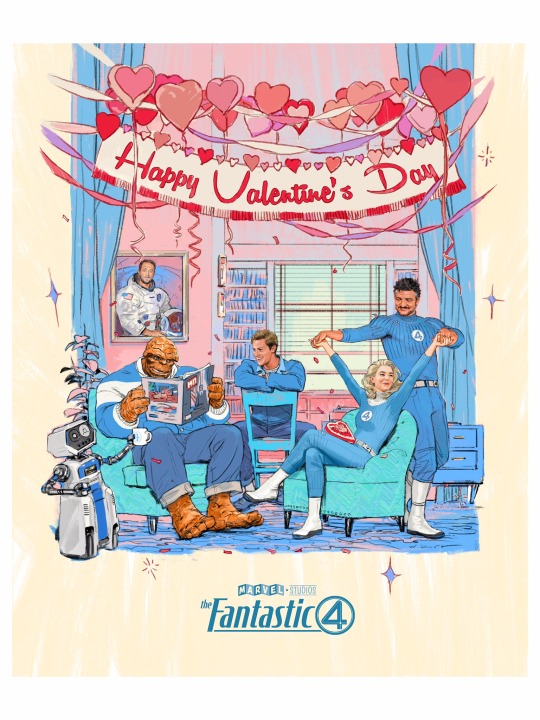
This has gotten people cautiously interested.....
Keyword: cautiously.
It's no surprise that the Marvel Cinematic Universe has been on a major decline since Avengers: Endgame.
Largely due to ridiculous quantity of projects they've been pumping out a year.
Plus that fact that a lot of these projects quality-wise have been either mid or just straight up dog-shit.
This has led to the ongoing trend known as Marvel Fatigue.
Not helping any of this is some of the behind-the-scenes stuff that was revealed over the last few years.
From having their projects being helm by people who have little to no knowledge or care for the characters and the source material they're working it.
And we all know how well that turns out....
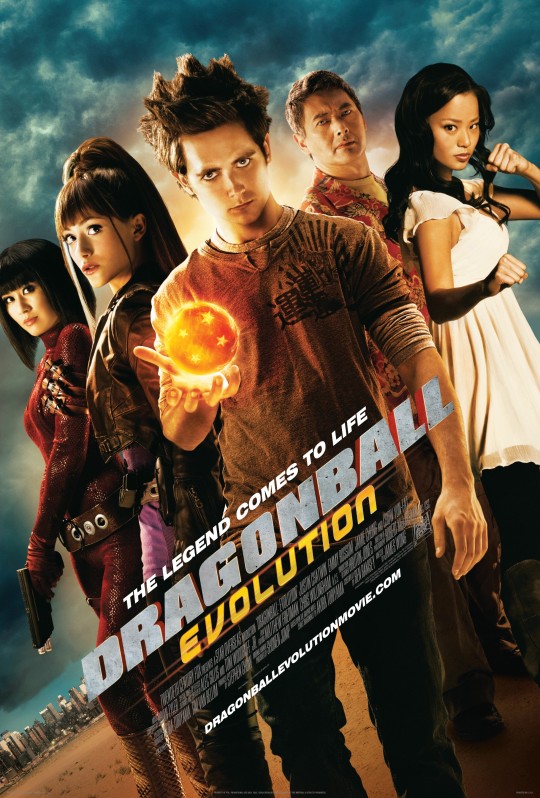
To more infamously, overworking and underpaying their VFX artists.
And given some of the shit they've had to animate, they NEED to start getting better pay....
youtube
Yes.....what you just saw was a real scene from a Marvel movie.
And just to add salt to the wound, in addition to the declining interest, is that these recent Marvel films have not been performing well financially.
Hell, The Marvels (their latest film) ended up being a box office bomb, only grossing $206 million worldwide against production budget of $274.8 million. Not only that, but it now holds the record for being the lowest grossing film in the franchise's history.
So yeah.....
Although the casting is pretty decent, the inclusion of H.E.R.B.I.E. was quite the surprise, and the 60s aesthetic/vibes are pretty cool, people still have their reservations for this film given the MCU's track record lately.
However, one thing everyone does seem to agree on is that this film can't be any worse than their last cinematic outing.....
The Fantastic Four have had, funnily enough, have had four feature-length adaptations.
The very first film adaptation of Marvel's First Family was the legendary 1994 film from Roger Corman.
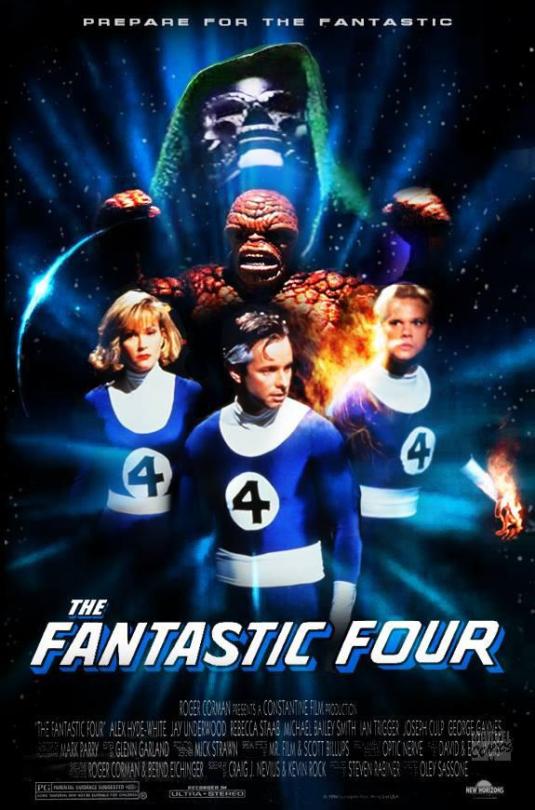
Although it was completed and ready to release, it famously never got released (which I'll touch a little more on later).
However, copies of the film have been circulating since May 31st, 1994.
Over a decade later, the Fantastic Four would get their technically second but first true feature-length film in the form of the 2005 film, directed by Tim Story, and released by 20th Century Fox on July 8th, 2005.
This film would also get a sequel just two years later with Rise of the Silver Surfer, directed again by Story and released by Fox on June 15th, 2007.
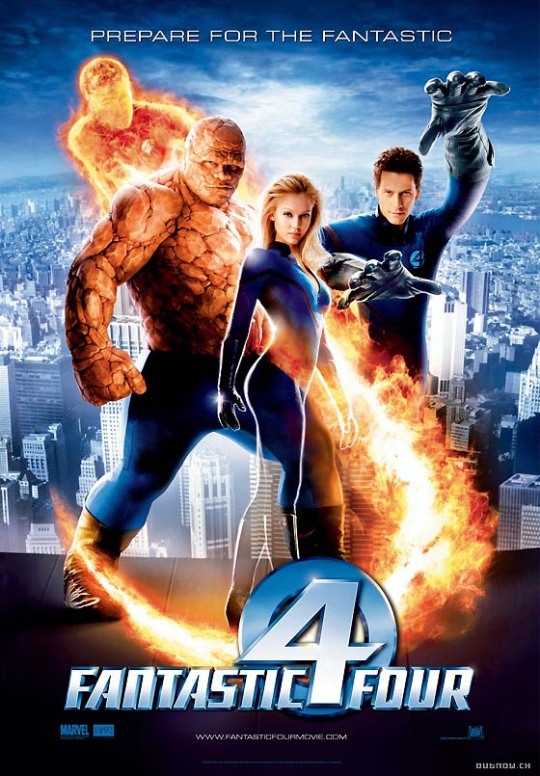
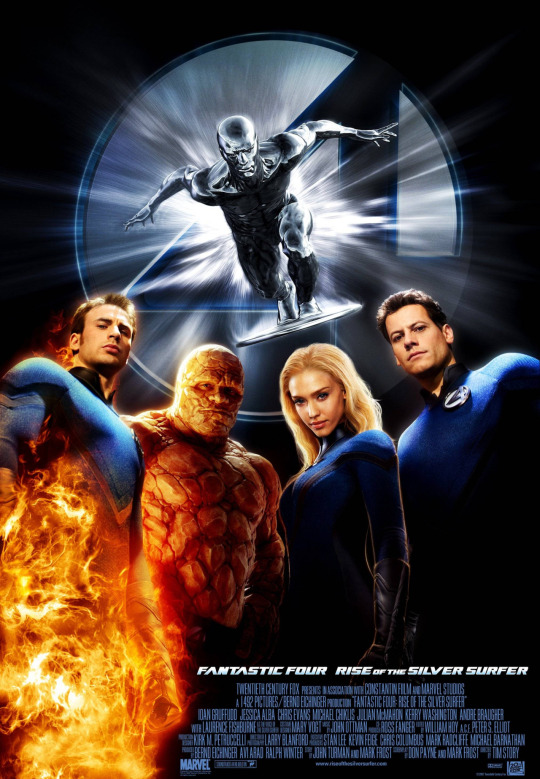
And finally, after almost a decade away from the big screen, the FF would return with their fourth and until the MCU film releases, latest film, the 2015 film, or more commonly known as Fant4stic, as that's how it was abbreviated...
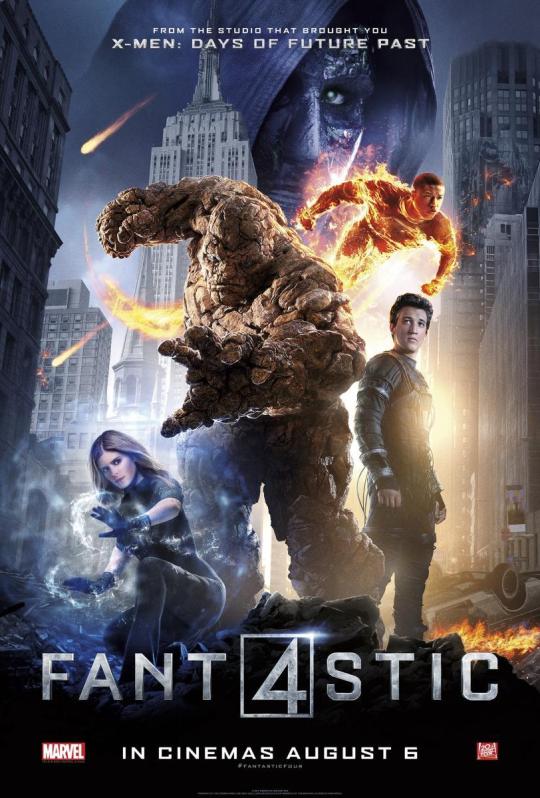
A Fantastic Nightmare:
In August 2009, Fox would announce that they would be rebooting the Fantastic Four film franchise.
The reason why is because although Rise of the Silver Surfer did fairly well, grossing $301 million worldwide against a $120-130 million budget, the total gross was notably lesser than the first movie, which grossed $333.5 million worldwide.
And although there were plans for a third movie and a spin-off film focusing on The Silver Surfer, Fox feared those films could possibly be money sinks and opted to reboot the film franchise as a whole.
For the next three years, not a whole lot of progress was done with the planned reboot, apart from the hiring of producers and writers and the consideration of actors.
But the production of the film really started rolling in July 2012 when Fox hired Josh Trank, who was fresh off his directorial debut, Chronicle, to direct film.
And accompanying him was Jeremy Slater, who was hired to the screenwriter for the film, alongside X-Men: First Class writers Zack Stentz and Ashley Edward Miller.
And this where everything went to shit....
If any of you even know about Fant4stic, you'd probably know that it has one of the most turbulent production histories in the last decade of filmmaking.
Before we start actually looking into the production itself, first we need to look at the reason why it was even made in the first place.
And this point brings me back to the 1994 film.
Both that and this film were created for the exact same reason: copyright hoarding.
In 1983, the other producer of the 1994 film, Bernd Eichinger met with Fantastic Four co-creator and the Marvel legend himself, Stan Lee, in Los Angeles to explore obtaining an option for a movie based on Marvel's First Family. The option was not available until three years later, when Eichinger's production company Constantin Film obtained it for a price the producer called "not enormous" and which has been estimated to be $250,000.
Eichinger's initial plan was to have the movie be a full-on blockbuster directed by Chris Columbus, complete with a cast full of big name celebrities.
But despite some interest from Warner Bros. Pictures and Columbia Pictures, budget concerns precluded any production, and with the option scheduled to expire on December 31, 1992, Constantin asked Marvel for an extension. With none forthcoming, Eichinger planned to retain his option by producing a low-budget Fantastic Four film. In September 1992, he teamed with B-movie specialist Roger Corman, who agreed to produce the film on a $1 million budget, to be released by his distribution company New Horizons Pictures.
But we all know how that ended....
Essentially, the entire of that movie ended up in a one big legal loop-hole that only benefitted Eichinger, leaving dozen of people's lives played with and their hopes and dreams crushed.
And in the case of Fant4stic, it's essentially a tragic case of history repeating itself.
Fox only produced Fant4stic not because they were genuinely interested in doing another film based on The First Family, they only did it to use it as an excuse to latch onto the film rights.
As when the 2010s rolled out, Fox's time with the Fantastic Four were about to come to an end as eventually, their film rights would've been reverted back to Marvel, and to that extension, The Walt Disney Company.
But if they had made another Fantastic Four project pretty soon, they would be able to extend their time with the film rights.
And from what I've heard, it seems like Fox wanted to get this film rolling as quick possible with the approaching deadline to the rights.
That's probably the reason why they hired Trank out of all people that could've directed this film.
Which for a film like this, you would think that Fox would go with a director that's a bit more experienced since remember: upon his hiring as director for the project, Trank was fresh off his very first directorial film.
Though you're probably wondering what I meant when I said everything went to shit upon Trank's hiring, well....
There have been plenty of cases where the productions of films have been absolute chores for one of two reasons.
The director or producers just being infamously difficult to work with, like David O'Russel or Michael Bay.
The studio constantly meddling in the production, like....basically every film studio to ever exist.
But Fant4stic is one of the rare cases where both the studio and the director made the production a living hell.
Starting off with Fox (as funnily enough, they did the least amount of damage to the production), they were guilty of....
Forcing constant rewrites
Giving Trank a much-lower budget than initially promised
Hiring a prominent special effect expert for the film, then firing him and not telling Trank about it
When production finally wrapped on the film, they were so unhappy with the finished product, that they ordered massive reshoots, including the film climax
Upon finishing the reshoots, they locked Trank out of the editing room and finishing the theatrical cut of film without him
As for Trank.....Hoo boy! Where do I even begin?
He was guilty for......
Constantly butting heads with the studio executives
Treating the cast and crew like absolute shit
Not showing up to the set on time
Usually showing up completely hammered
Frequently hiding himself from everyone on set
Constantly getting into fights (verbal and even physical) with the cast and crew
Letting his dogs loose and causing $100,000 worth of damage on the set
Constantly fighting with the screenwriters about what the tone of the film should be like
And writing a now infamous tweet on Twitter just the day before the film's release, only to be instantly deleted the next day
youtube
And remember, this was the second film that Trank directed....
I've heard of Hollywood getting to people, but it usually takes a couple of years. But in the case of Trank, it practically happened overnight.
And funnily enough, a lot of this behind-the-scenes drama was revealed to the public even before the movie had an official trailer.
So expectations for this film were not particularly very high....
But now that we got that out of the way, let's talk about the actual movie itself.
The "Story":
Childhood friends Reed Richards and Ben Grimm have worked together on a prototype teleporter since youth, eventually attracting the attention of Professor Franklin Storm, director of the Baxter Foundation, a government-sponsored research institute for young prodigies. Reed is recruited to join them and aid Storm's children, scientist Sue Storm and engineer Johnny Storm, into completing a "Quantum Gate" designed by Storm's protégé Victor Von Doom.
The experiment is successful, and the facility's supervisor, Dr. Allen, plans to send a group from NASA to venture into a parallel dimension known as "Planet Zero". Disappointed at being denied the chance to join the expedition, Reed, Johnny and Victor along with Ben use the Quantum Gate to embark on an unsanctioned voyage to Planet Zero, which they learn is a world filled with otherworldly substances. Victor attempts to touch the green lava-like substance, causing the ground they are standing on to erupt. Reed, Johnny and Ben return to their shuttle just as Sue brings them back to Earth and Victor is seemingly killed after he falls into the collapsing landscape. The Quantum Gate explodes, altering Reed, Sue, Johnny and Ben on a genetic level and granting them superhuman abilities beyond their control: Reed can stretch like rubber, Sue can become invisible and generate force fields, Johnny can engulf his entire body in fire and fly, and Ben acquires a rock-like hide which gives him superhuman strength and durability. They are then placed in government custody to be studied and have their abilities tested. Blaming himself for the accident, Reed escapes from the facility and tries to find a cure for their changes.
One year later in 2015, Reed is now a fugitive and has built a suit that helps him control his ability. Hiding in Central America, he is eventually found by the United States military with Sue's help and captured by Ben, who has become a military asset along with Johnny and Sue. Johnny and Sue have been outfitted with specialized suits designed to help them control their abilities. Reed is brought to Area 57, where Dr. Allen conscripts him into rebuilding the Quantum Gate in exchange for giving Reed the resources to find a cure. Arriving in Planet Zero, Dr. Allen's explorers find Victor, who has been fused to his spacesuit and now possesses telekinetic abilities, and bring him back to Earth. Believing that Earth needs to be destroyed to protect his new home world from future invasions, Victor kills the scientists and soldiers in the base, including Dr. Allen and Professor Storm, and returns to Planet Zero using the Quantum Gate, with Ben, Johnny, Reed and Sue in pursuit.
Now dubbing himself "Doom", Victor activates a portal on Planet Zero using the Quantum Gate and begins consuming the landscape of the Earth using a structure he created from the rock formations in Planet Zero. He is confronted by the four and, after a short battle, Ben punches Doom into the portal's energy beam, disintegrating him while Johnny closes the portal. Returning to Earth, the group is rewarded by the US military for their heroics by being given a new base of operations known as "Central City" to study their abilities without government interference. They decide to use their powers to help people and adopt the mantle of the "Fantastic Four".
youtube
Yeah, I basically just copied and pasted the premise of this film from Wikipedia.
The reason why is because there really isn't a whole lot to talk about.
The plot is paper thin, and the execution doesn't do it any favors.
In terms of adaptation, this film doesn't really adapt any notable Fantastic Four storylines.
The closest thing to this is that it's a loose adaptation of the first volume/arc of Ultimate Fantastic Four.
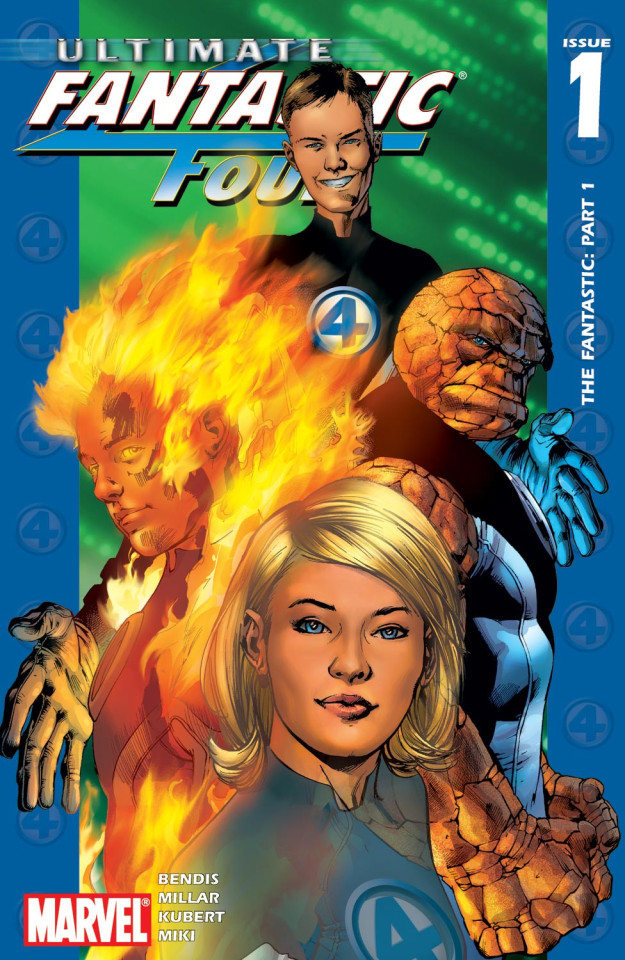
You can see this with elements such as.....
The Four themselves being depicted as teenagers/young adults
Reed and Ben being childhood best friends
Franklin Storm actually being a major character whereas in the 616 universe, he's largely irrelevant
The Baxter Building being turned into The Baxter Foundation
The reason for them getting their powers being a teleportation experiment gone wrong
And Doom being involved with the experiment as well and his famous armor being his actual skin instead
However, that's as far as it goes. They don't really bother to adapt the actual story of that arc, which has the team facing off against The Mole Man.
But one of the strangest story choices with this movie is in the case of Planet Zero.
Planet Zero is reportedly suppose to be Fant4stic's version of The Negative Zone.
Why they didn't just call it The Negative Zone, I have no clue.....
But as most of you know, The Negative Zone is famous for being the realm of one of the Fantastic Four's most prominent foes: Annihilus.
And with their version of The Negative Zone, you would think they would probably feature Annihilus in this movie.
But no! He doesn't appear at all nor is he even alluded to. In fact, Planet Zero is depicted as being a lifeless wasteland, with no living organisms in sight.
The Sucky Tone:
In contrast to the previous 3 FF films, this one is far more darker, serious and grounded.
This was because Trank wanted the tone of the movie to be, in his own words, "gritty, serious and as realistic as possible".
And it's safe to that Fox also encouraged this tone as well.
From the early 2000s into the mid-2010s, a good chunk of superhero films relied on taking superheroes and making them darker, gritty and more grounded than they were in their source material and other adaptations.
This can be largely attributed to the X-Men films, which were more serious and grounded than the comics and their other adaptations.
This was done because after the failure of Batman and Robin, comic books movies were briefly seen as cinema poison.
The X-Men films, Daredevil, Elektra, The Dark Knight trilogy, The Amazing Spider-Man duology, and even the first few films of the DC Extended Universe all prided themselves on being more dark, gritter and grounded than their source material and sometimes even predecessors in film.
And while most of these movies are still fondly remembered, I'm gonna have to come out and say this....
I'm not a fan of these films.
Apart from some of these characters just not fitting with a darker and gritty tone, the biggest reason why I don't like these films is because a lot of them reek of this sense of embarrassment and contempt for the source material they're adapting.
Like, some of them are not even being that subtle about it.
youtube
I am so glad this was finally made fun of in an actual Marvel project.
youtube
And in an age where a lot of producers and directors working on a projects based on long, established properties have been open about either not caring or straight up disliking the properties they're working with, its made many of these films age kinda poorly.
However, there were some superheroes films from the 2000s that didn't fall into this trap.
Undoubtedly the biggest is in the case of the Sam Raimi Spider-Man trilogy.
Those films were unabashedly campy, and were obviously made by people who legitimately cared about, understood and loved Spider-Man.
That's why despite of a having a few faults, the films are still talked about in high regards, even after two decades.
And notably more so than the films I just mentioned.
But back to the film itself, to the Fantastic Four having a dark, gritty and grounded tone.
Most people, myself include, would have to say....
youtube
Fantastic Four, while having their dark and serious moments here and there, are some of the most light-hearted characters in Marvel.
Trying to make them dark and gritty just feels incredibly tryhard.
And as for being grounded and realistic.
That's completely antithetical to the Fantastic Four.
They're adventurers and explorers. And many of their adventures have taken place in space, other dimensions, and alternate realties. It's one of the core appeals of the team.
And as you would expect, this tone did not do the film any favors.
Fant4stic is so. Fucking. Boring.
It is deathly serious with no sense of levity or humor to be detected.
The music is bland and generic, the color grading is dull as hell, and the performances....
Dear God....the performances.
I think this actually perfectly segways into the biggest and most important part of this post:
The "Characters":
One of the strongest draws of The Fantastic Four is, well, The Fantastic Four themselves.
All of them are very likable, charming, interesting and endearing in their own way.
And does Fant4stic capture anything that made these characters so great?
youtube
Let's start off with Reed first.
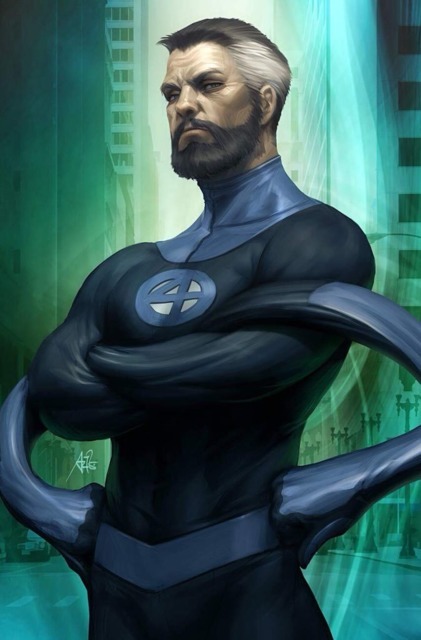
Reed in the comics and in just about every other medium is a genius, a polymath to exact.
In fact, he's tied with another one of the main characters I'll be talking about soon as being the smartest person in the Marvel Universe.
But besides being intelligent, Reed is also curious, adventurous, charismatic, level-headed, kind, and most importantly of all, passionate.
Reed is passionate about two things:
-His love for his family
-And his love for science and adventure
And while he can be little over-analytical, a little reserved at times, and have a bit of a one-mind track (so much so that he's been headcanon by just about everyone to be autistic), Reed overall is a very kind, caring and compassionate person.
Hell, he (along with the rest of the four) are some of the most morally righteous people in the Marvel Universe alongside Spider-Man and Captain America.
Now let's look at Fant4astic Reed....
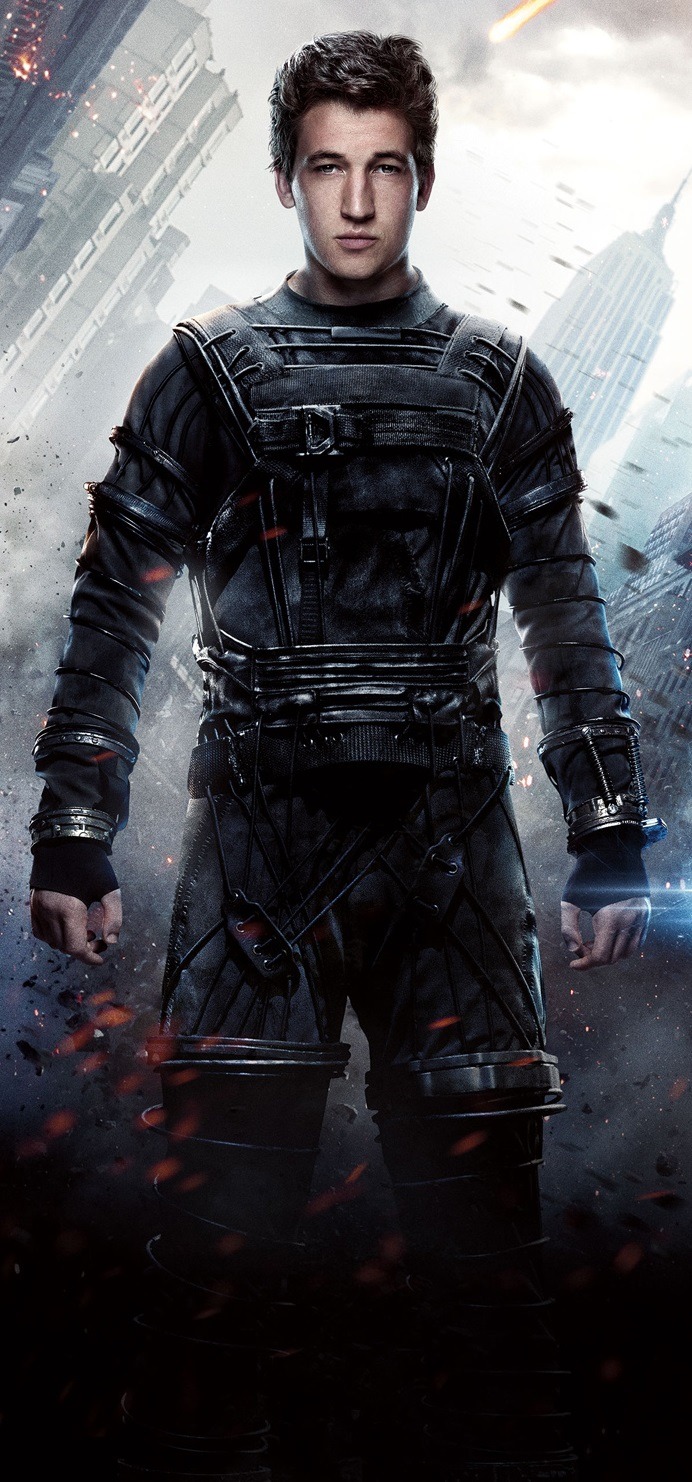
Apart from being intelligent, level-headed and maybe curious, has none of the traits I just listed.
He's not adventurous.
He's not shown to be all that kind.
He has all the charisma of a funeral service.
And worst of all, he's not very passionate.
In the comics, Reed loves science and is always down to learn something new.
But the way Reed approaches science in the movie, it feels more like an obligation rather than something he's actually passionate about.
Next we have Sue.
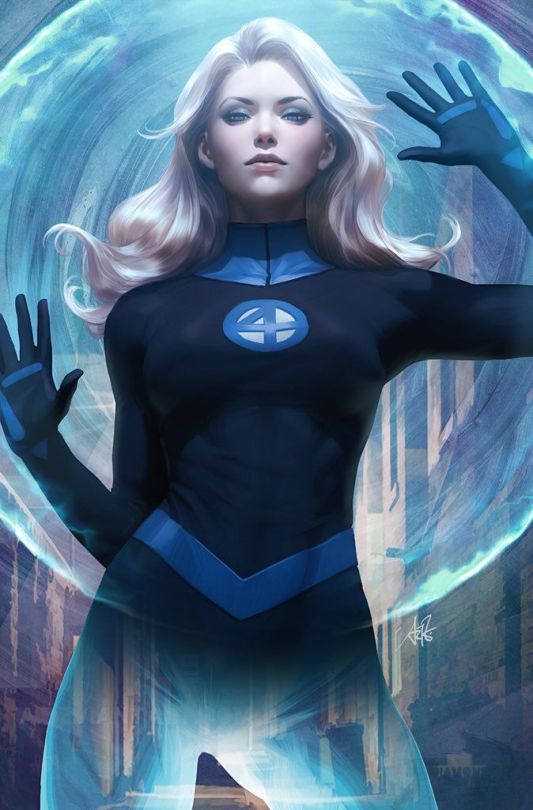
Sue is pretty much the mother figure of the four.
Warm, caring, kind, mindful and responsible.
But she's also incredibly terrifying.
Sue's the most powerful member of the four and has proven to be a force to be reckon with for anyone who cares to hurt her family, especially her children.
Now let's look at Fant4astic Sue....

Well, how do l put this in the kindest way possible?
youtube
Yeah. Apart from being introverted, she's also shown to be incredibly sarcastic.
Like, modern animated adult comedy levels of being sarcastic.
And needlessly so.
Apart from still being responsible, Sue shows none of the traits I just listed.
The only character see isn’t needlessly sarcastic to is her and Johnny’s father, Franklin.
This version of the character is the walking definition of a killjoy.
Next we have her brother Johnny.
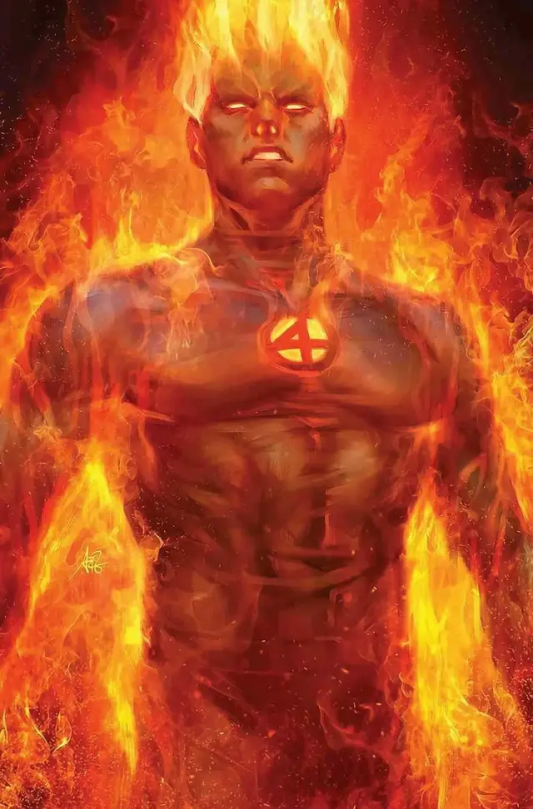
Johnny is the little brother of the group, since he’s the youngest.
He’s cocky, brash, hotheaded, a bit of a prankster, and kind of a showoff.
But in spite of that, Johnny is also a very kind and loyal individual.
The dude has been show that he’s willing to die for those he deeply cares for.
Now let’s look at Fant4stic Johnny.
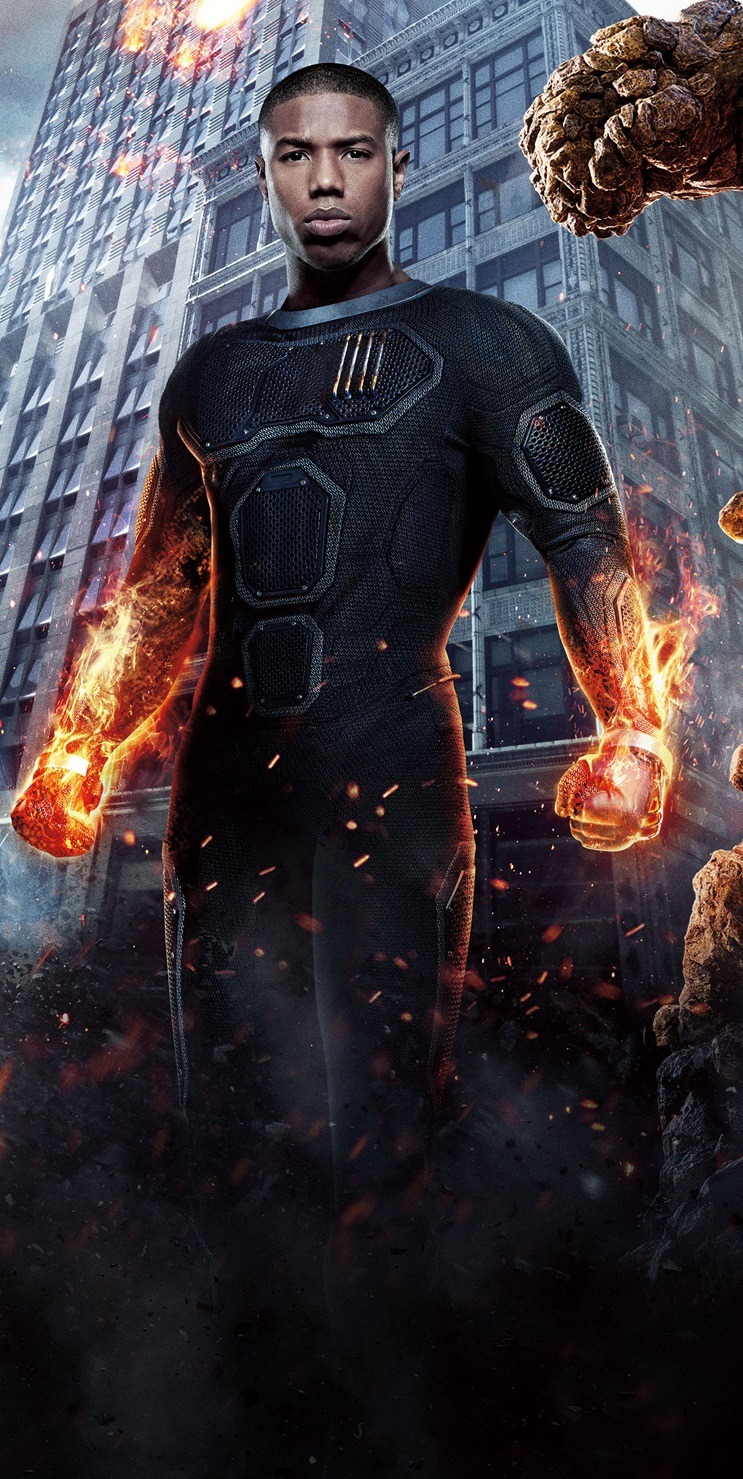
Johnny is really the only character who somewhat resembles his original comic counterpart.
But even then, it still feels somewhat subdued.
Plus he has the same issue as Sue with him being needlessly a dick to people.
Like, Johnny had his dickish moments, but wasn't a massive asshole.
And plus, I should probably address the elephant in the room.
As you could probably tell for yourselves, Johnny here is African-American, making him and Sue adopted siblings.
And this would be the very first (and so far only) iterations of the Storm siblings who weren't blood-related.
And in all honesty, I'm not a fan of it.
Having Johnny and Sue not being biologically-related just feels wrong.
That would be like having Mario and Luigi not being related.
Or Goofy and Max.
Or Dante and Vergil.
Sometimes, you can't alter an important familial relationship.
As for why Johnny was made black while Sue wasn't.
Well....
Apparently, the Storm Family were all gonna be black, including Sue. But the higher-ups were not really onboard with Sue being black (I'm not even gonna try to make sense of that). But they were allowed to make Johnny and Franklin black. So thus, Sue ended up being adopted by the Storms.
And I must ask....
Why?
Why did they want to make the entire Storm family black?
I'm guessing it was to give a new fresh take on the characters.
But that's kind of debatable when we get to a point I'll bring up a little later.
And in terms of casting a black Johnny Storm, I don't think Michael B. Jordan was the best choice.
He just doesn't look like how most people would see Johnny as being black.
I think there's two reasons for that.
The hairstyle. Johnny has usually been depicted as having spiky hair. I think if had Michael those upward locs, then I could see him passing for a black Johnny.
The age of the actor. In fact, this applies to all the actors of the four as well. In the film, the four are said to be teenagers, specifically fresh out of high school age. So basically they would be around 17-18 years old. It's hard to see any of them as being around that age range when the actors who played them were, at the time of the film's release, two of them were 28, one of them was 29, and one of them was 32! Did they really just not bother to look for actors who were like college-aged?
Now we come to Ben.
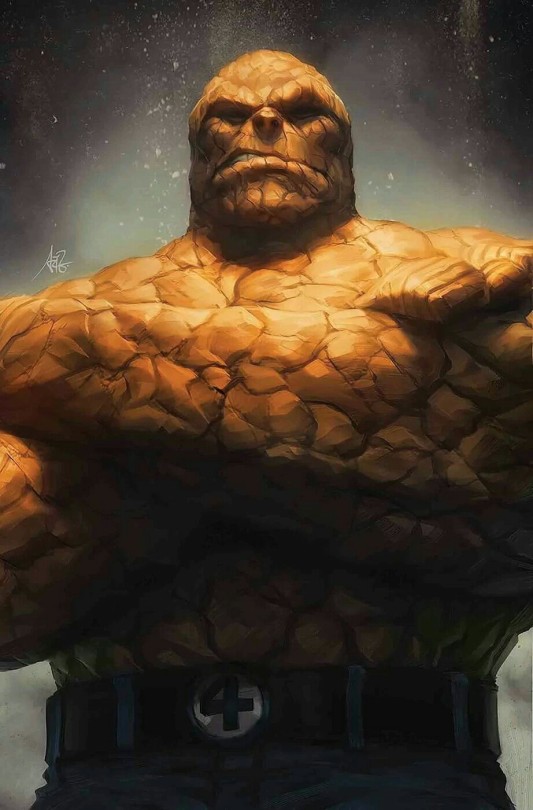
Ben is undoubtedly most people's favorite member of the Fantastic Four.
While gruff, tough and a tad pessimistic and grumpy due to his circumstances, underneath Ben's rocky exterior beats a heart of gold.
He deeply cares for his friends and family and will go out of his way to protect them no matter what.
Now let's look at Fant4astic Ben.
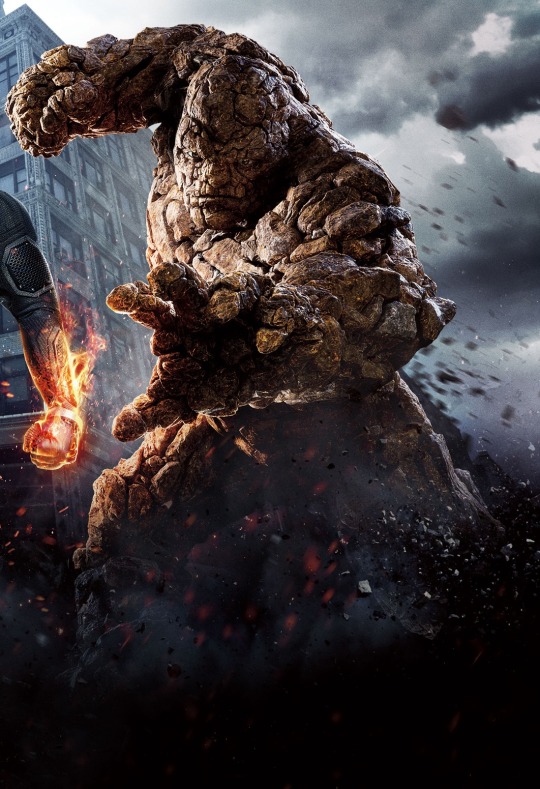
Ben, being only rivaled by the next character we'll be talking about, is the character who barely resembles his original counterpart the most.
First, there's his appearance. Specifically before he became The Thing.
Out of this already not-good cast, Jaime Bell was probably the most miscasted of them all.
For starters, he just doesn't look like Ben Grimm at all.
Like, take a look at this guy and tell me that he looks remotely like the pre-Thing Ben in the comics.
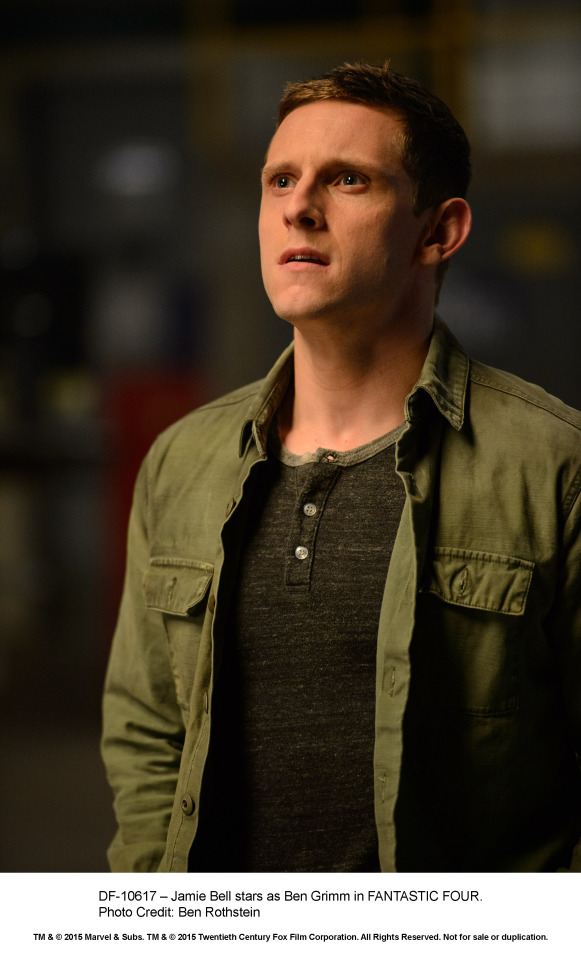
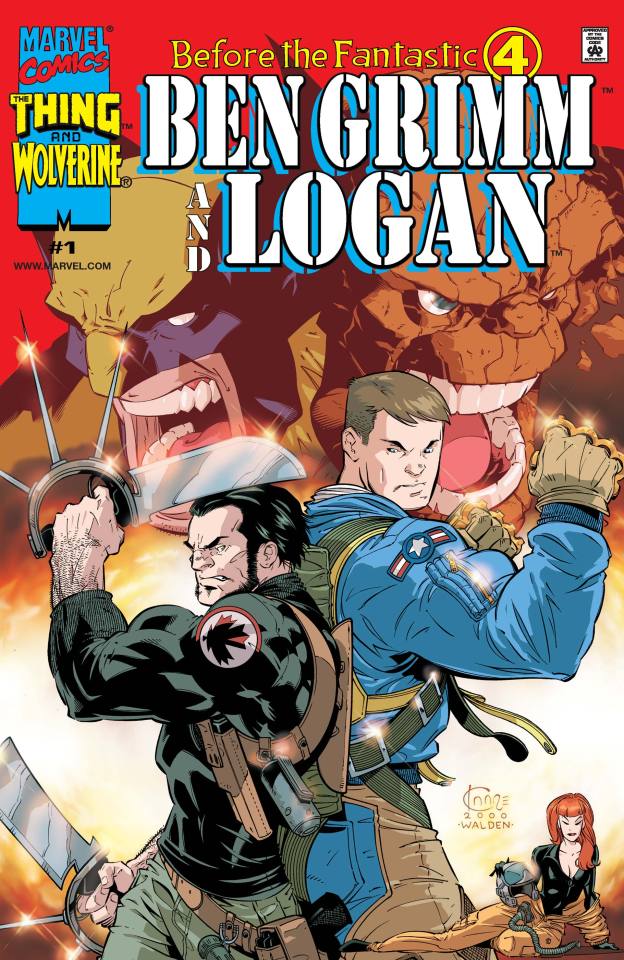
Basically, Jaime suffers from the same problem that Topher Grace had when he played Venom.
He's too short. Ben, even before becoming The Thing, was usually depicted as being pretty tall, 6'0 to be exact. Jaime is 5'7. The dude is literally no taller than me (and I'm 5'8).
He's way too skinny. Once again, even before becoming The Thing, Ben is usually shown to be a pretty muscular-looking guy. He is canonically a skilled brawler (due to him being part of a street gang during his youth) and played on the football team in high school.
Essentially, even before becoming The Thing, Ben looked like a guy who could and can beat your ass.
This Ben looks like the guy who YOU would be beating the ass of!
Then there's his characterization.
This Ben has none of the traits I just mentioned.
Apart from being kind, he's typically portrayed as being soft-spoken and somewhat meek.
Which just don't fit the character of Ben Grimm at all.
But I think the worst part of his characterization is that he doesn't even have a Brooklyn accent!
youtube
Yeah! He doesn't have a Brooklyn accent! Despite it being one of the most famous elements of his character.
I'm the guy who think that a character should have their accent intact if they originally had it.
I'm one of the few people who find it kinda annoying that Black Widow doesn't speak with a Russian accent anymore despite speaking with one all-time in her appearances pre-MCU.
And I'm sure that I'm the only guy on the planet who actually wants Magneto to speak with a German accent.
But Ben not speaking with a Brooklyn accent feels both disgraceful and just plain wrong.
But perhaps the worst thing about this version of Ben is with his trademark catchphrase: It's Clobberin' Time!
In this film, they decided to give the catchphrase an origin.
Because we all know that what's the fans were certainly asking for it....
But anyway, in the Fant4stic continuity, It's Clobberin' Time was what Ben's abusive older brother who regularly beat him, would say right before kicking his ass!
youtube
Why?
Why was this added?
Who thought this was a good idea?
It adds nothing to this already nothing story.
Having Ben's catchphrase being the result of abuse from his older brother comes off as both incredibly fucked-up and like the rest of this cursed movie, unnecessarily tryhard.
The people who thought that giving this iconic catchphrase a gritty reason for existing need to get repeatedly smacked in the face.
But like I mentioned before, there's only one other character in the movie that rivals Ben in being the biggest spit in the face to their original counterpart.
But I'm gonna save that for next time.
Yeah, I'm gonna have to end this post right here since I'm pretty close to reaching the media post limit.
So this is gonna be a two-parter.
Wasn't the original intent, but hey, you can't win them all.
But tune in next time where I finish looking at this terrible movie.
And beware....I'm not gonna be very kind.
#fantastic four#20th century fox#reed richards#susan storm#johnny storm#ben grimm#marvel cinematic universe#mcu#josh trank#fantastic four 2025#marvel#marvel comics#fox marvel
10 notes
·
View notes
Text
Free Tools Every Beginner Needs to Start Digital Marketing

Starting your journey in digital marketing? You don’t need to spend thousands to get going. With the right free tools and a bit of guidance, anyone can start building campaigns, analyzing results, and growing their online presence.
In fact, enrolling in the best digital marketing course can help you learn how to use these tools effectively. If you're looking for expert-led, practical training, the best digital marketing course in Hyderabad is a great place to start!
Let’s explore the top free tools every beginner should know.
Google Keyword Planner
One of the most recommended tools taught in every top digital marketing course, Google Keyword Planner helps beginners:
Find the right keywords
Understand search volume
Analyze keyword competition
This tool is often the starting point for anyone creating SEO or Google Ads strategies.
Google Analytics
Every digital marketer needs to track how users interact with their website. Google Analytics is a must-have tool to:
Monitor website traffic
Understand user behavior
Identify top-performing pages
The best digital marketing courses in Hyderabad include hands-on sessions on using Google Analytics to drive better results.
Google Search Console
This tool helps you:
Check how your site performs in Google Search
Fix indexing issues
Track keyword impressions and clicks
It’s covered in depth in the best digital marketing courses, especially in SEO and performance marketing modules.
Canva
Not a designer? No problem! Canva is a drag-and-drop tool for creating:
Social media graphics
Posters and presentations
YouTube thumbnails and more
Most instructors from the best digital marketing course in Hyderabad recommend Canva to beginners for quick and professional design.
Mailchimp (Free Plan)
Email marketing is powerful, and Mailchimp helps you get started for free:
Send automated emails
Build subscriber lists
Design email templates easily
Used widely in real-world projects, this tool is commonly included in digital marketing course curriculums.
Meta Business Suite
Running Facebook and Instagram campaigns? Meta Business Suite lets you:
Schedule and publish posts
Manage messages
Track ad performance
It’s one of the essential tools introduced in any best digital marketing course with a focus on social media marketing.
Ubersuggest
Created by marketing expert Neil Patel, this SEO tool helps with:
Keyword ideas
Competitor research
Site audits
Beginners love it for its simplicity — and it’s often mentioned in digital marketing training sessions.
Bitly
Bitly shortens long URLs and tracks how many clicks you get — simple but powerful for social media marketers. Many trainers from the best digital marketing course in Hyderabad recommend it for campaign tracking.
Conclusion:
Digital marketing doesn't have to be expensive when you're just starting out. With free tools like Google Keyword Planner, Canva, and Google Analytics, you can begin learning and applying marketing strategies right away.
But tools alone aren't enough. Learning how to use them the right way matters. That’s why enrolling in the best digital marketing course — especially if you're in a city like Hyderabad — can give you a huge edge. The best digital marketing course in Hyderabad blends hands-on training, real-time projects, and expert guidance to make you job-ready.
#best digital marketing course#best digital marketing course in Hyderabad#OnlineMarketing#digital marketing course curriculums.#MarketingTips#SEO
2 notes
·
View notes
Text
Event Story: Precious as a White Light - Track 9: Epilogue

📍 HAMA Tours, Office Floor
Kafka: Hm~ …You’re missing a line here. You need an extra statement here or else you’ll run into an error.
Ushio: Oh, I see.
[Keyboard sounds]
Ushio: Like this?
Kafka: Yup, exactly. You must’ve studied hard, since you can immediately fix your mistakes once they’re pointed out. A gold star for you.
Ushio: Ugh… I’m not a kid, geez. Also, finding the problem is usually the hardest part.
Kaede: What are you two up to?
Kafka: I’m just giving Ushio a small programming crash course on an introduction to robotics in return for the baking lessons.
Kafka: It seems he’s self-taught, but he’s got the basics down. He’s basically a model student.
Ushio: …You’re just saying that. I realized that I’ve just been taking the long way around once you actually started going through stuff with me.
Kafka: You’re such a contrarian~ I’m praising you, so you can just be happy about it.
Kaede: I didn’t know you were interested in programming, Ushio-kun.
Ushio: ……I want to be able to perform fixes and maintenance on robots.
Ushio: And Oguro-san’s pretty good at teaching, so.
Kafka: What we’ve done so far is pretty much a walk in the park. Okay, let’s move on to the next problem.
Ushio: W-Wait, lemme look over what we just did…!
Kaede: (Ushio-kun seems to be taking it really seriously. Kafka looks like he’s having fun too, so it must be worth teaching him.)
Kaede: (For some reason, it’s making me happy too.)
📍 HAMA House, Living Room
Nanaki: Hey, Ushio. About that playlist I sent you yesterday…
Ushio: …!
Nanaki: What’d you think? I wanna hear your thoughts on it.
Ushio: …Didn’t you make that to thank me for my help? I don’t see why exactly I need to give you my thoughts on it.
Nanaki: It’s because I need to know if that’s actually a decent thank-you gift. Like, I had no idea what you needed it for, so I just threw a bunch of songs together based on the keywords you gave me and hoped for the best.
Ushio: (“It’s actually a theme playlist for my OTP” …As if I could say that? My secrets are between me and God.)
Nanaki: Besides, I wanna make sure we’re even. If the playlist’s good, then great. But if not, then tell me.
Ushio: Erm……
Ushio: (It kinda pisses me off that he was able to mysteriously put together such a high quality playlist just from a single word.)
Ushio: (But I guess that’s just how good it is.)
Ushio: …You don’t owe me anything anymore.
Nanaki: Really? Well, if you’re saying that with that look on your face, then you must’ve really liked it.
Ushio: …Huh? Can you stop making baseless assumptions about me?
Nanaki: I was just asking a question, though.
Ushio: Excuse me???
Nanaki: …See, you always get all defensive like that, but I’m not buying whatever you say today.
Nanaki: You were being so difficult about it that I had a hard time picking the right songs. I was worried if the playlist even worked, so I kept digging even after I sent it to you…
Ushio: Huh?
Ushio: ……You have more songs?
Nanaki: What?
Ushio: I’m asking if you found more songs based on my request aside from the playlist you sent me.
Nanaki: Yeah, I did. …Wanna hear them now?
Ushio: …
Nanaki: Oh, but since we’re even now, how about this? You can listen if you actually tell me what you think this time.
Ushio: …And what makes you think I’d tell you my thoughts or anything for that matter if you don’t let me do a full listen first? Like, can you stop nitpicking and hurry up and press play?
📍 HAMA House, Entrance
Kaede: (Wha…., HUUH—!!!!)
Kaede: (Ushio-kun and Nanaki-kun are listening to music together…?!)
Kaede: (I see, I get it… Those two have gotten closer.)
Kaede: Hehehe…
📍 HAMA House, Living Room
Ushio: …Um, so why is the shady man over there suddenly laughing to himself like a creep?
Nanaki: Chief!
Kaede: Ah! Sorry, sorry. Just ignore me…
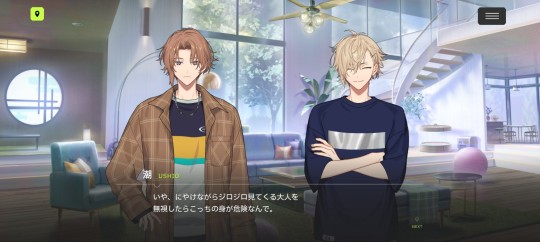
Ushio: And just what do you think will happen if I ignore an adult that keeps staring holes at me while grinning to himself.
Nanaki: Seriously, you never really change.
Ushio: Oh? Didn’t you say you weren’t buying my words today?
Nanaki: Save your sarcasm for tomorrow.
Kaede: Sorry for bothering you two. It was just so heartwarming, I couldn’t help myself.
Nanaki: Heartwarming…?
Kaede: I was just thinking that everyone’s gotten so much closer from baking together. Especially Ushio-kun, Kafka, and Nanaki-kun.
Kaede: White Day was such a great day… I’m just savoring it.
Ushio: …………Are you for real?
Kaede: Huh, was I wrong…?
Ushio: That’s what’s on your mind after that series of events…?
Ten: Ahaha. I totally saw this coming. Very in-character of you, Chief~
Kaede: Ah! You scared me! Ten-kun and Kiroku-kun… Um, what’s going on?
Kiroku: I think… that’s just like you… Chief.
Kafka: Huh? What are you all doing here?
Kaede: Kafka!
Ten: Nah, we were just talking about how the chief has some serious talent~
Kaede: Huh? What do you mean? Did I say something weird…?
Kafka: Ahhh… He definitely does. But that’s one of his charms ♪
Nanaki: …True.
Kaede: Huuuh? Wait, am I the only one who doesn’t get it?
Nanaki: (Well, that’s the chief for you.)
Kafka: (That’s what makes him our chief, after all.)
Kaede: ……K-Kiroku-kun, Ushio-kun…
Kiroku: Being oblivious… is a good thing. I think….
Ushio: At this rate, he’s gonna stay like that until his hair goes white.
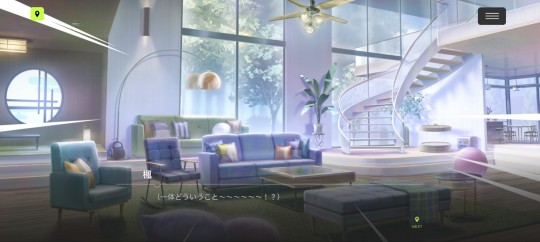
Kaede: (What in the world are they talking about~~~~~~!?)
Track 1 | Track 2 | Track 3 | Track 4 | Track 5 | Track 6 | Track 7 | Track 8 | Track 9
4 notes
·
View notes
Text
SECRETS OF MONETIZING WEBSITES AND GENERATING REVENUE FROM WEBSITES USING AFFILIATE OFFERS AND ADSENSE
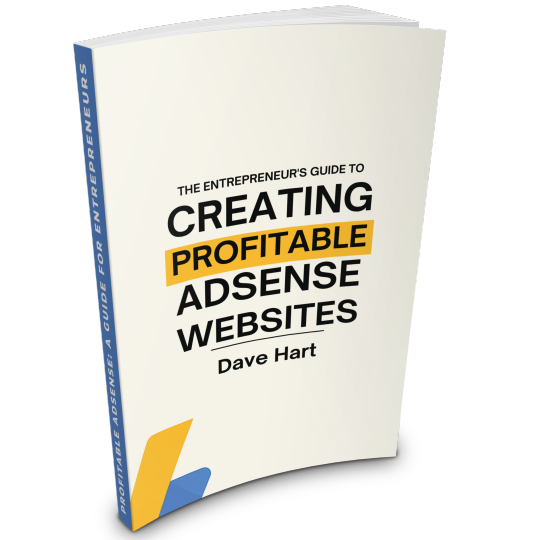
Welcome, everyone! Today, we're diving into the world of affiliate marketing and exploring how to effectively create an informational website that can turn your passion for writing into a profitable venture using the https://website.fm platform.
The Concept of Affiliate Marketing Let’s start with the basics. Affiliate marketing is a performance-based business model where you earn a commission by promoting other people's or companies' products. It’s a fantastic way to generate income online, but to do it successfully, you need a strategy.
Understanding Long Tail Keywords
Now, one of the most effective strategies in affiliate marketing is focusing on long tail keywords. Long tail keywords are phrases that are more specific and usually longer than the more commonly searched for terms. For example, instead of targeting "running shoes," you might aim for "best running shoes for flat feet."
Why long tail keywords? They tend to have lower competition, making it easier to rank on search engines. Plus, they often attract users who are further along in the buying process, meaning they’re more likely to convert into sales.
Building Your Informational Website So, how do you build an effective informational website? First, you need to choose a niche that you’re passionate about and that has potential for affiliate marketing. Think about your interests and expertise—this will make content creation much easier and more enjoyable.
Once you've selected your niche, it's time to create content that targets those long tail keywords. Start by doing keyword research using tools like Google Keyword Planner, SEMrush, or Ahrefs. Look for keywords that have good search volume but low competition.
Crafting High-Quality Content Next, focus on crafting high-quality, informative content that genuinely helps your audience. Write blog posts, guides, and how-tos that answer common questions related to your niche. For instance, if your site is about running shoes, create content about how to choose the right running shoes, the best brands for different foot types, or reviews of specific models.
youtube
Remember, the key is to provide value. The more useful your content is, the more likely visitors will trust your recommendations and click on your affiliate links.
Integrating Affiliate Banners Now, let’s talk about integrating affiliate banners into your website. Choose relevant WEBSITE MONETIZATION that align with your niche and the content you’re creating. For example, if you’re writing about running shoes, you might want to partner with athletic brands or retailers.
Place affiliate banners strategically within your content. You can include them at the beginning, middle, or end of your blog posts. Just be sure they don’t disrupt the flow of your content. You want your readers to feel like they are discovering valuable information, not being bombarded with ads.
Promoting Your Website Once your site is up and running, it’s essential to promote it. Utilize social media platforms, engage with online communities related to your niche, and consider guest posting on other blogs. Building backlinks to your site can significantly boost your SEO, helping you rank higher in search results.
Analyzing and Optimizing As you start to drive traffic to your website, don’t forget to analyze your performance. Use tools like Google Analytics to track your visitors, see which content is performing well, and which affiliate links are getting clicked. This data is invaluable for optimizing your strategy and enhancing your future content.
Automated High Speed Solutions to Save Time and Money
The fastest and most effective way to create large information based websites, pre-embedded with your affiliate offers, adsense and other banner codes is http://website.fm .
Conclusion In conclusion, affiliate marketing through informational websites is a powerful way to earn income online. By focusing on long tail keywords, creating high-quality content, and strategically placing affiliate banners, you can build a successful affiliate marketing business. It requires patience and effort, but with the right approach, the rewards can be substantial.
Thank you for joining me today! I hope you feel inspired to embark on your affiliate marketing journey. Remember, success comes to those who are willing to learn and adapt. Happy marketing!
2 notes
·
View notes
Note
PLEASE TALK ABOUT THE PRSK X PERSONA AU PLEASE 🙏 (you dont have to)
ok so i made this like a year ago and ORIGINALLY it was leaders pt au but i'll be honest the leaders are not nearly as compelling to me anymore so if i were to revamp it they would not be the pt. but here's how it was going originally.
akito is being Weird. he's lashing out and not acting like himself and not even toya or ken can diffuse him. the leaders all hear about this in varying ways (kohane Has It Happen To Her, she tells minori and ichika directly. toya goes and tells tsukasa for something something tenma siblings reasons. i don't think he discloses akito's name but like it's not hard to figure out. kanade overhears ena and akito screaming over nightcord call and is like "wow that one seemed way worse than any of the other ones what the hell")
and the leaders all have this funny little track next to sekai that lets them into the metaverse. so, independently, the five of them try to solve this problem by entering akito's keywords (which i had not decided on LMFAO). the girls pretty much meet up immediately and are like "cool we should team up". they don't find tsukasa until like halfway through the palace when he is one-on-one fighting a miniboss shadow and they have to save him and he's like "I TOTALLY DIDN'T NEED SAVING BY THE WAY!!!!" and they're like yeah sure buddy. come with us you can't be trusted on your own
mostly i was just entranced by the idea of giving prsk characters Palaces. mafuyu's like i said was a prison and her mother was the warden. some other facts about mafuyu's Palace are that it is mostly monochrome except for this tiny little oasis. well that oasis is Also monochrome until the pt rescue the voice of nightcord from mafumom's holding cell. (niigo inside of mafuyu's Palace are just voices in the form of tiny, glowing orbs. they can float around too) this Palace is set during main story (so when she took mafuyu's equipment away) and this is why they step in because they think she is fr gonna kill herself. also i had some ideas for a joint Palace thing where mafuyu's mother's thoughts and desires also influenced it. in mafuyu's vision she's a prisoner and her mother is the warden but in mafumom's vision she's a puppeteer guiding a puppet that moves mostly on its own. and sometimes she just needs a gentle push.
and then for main story honami i had an idea of like. her thinking of the school/her social life as an undertow. big water fortress where you can enter but can't leave. well it's hard to enter regardless because of the enormous walls she put up so you just sort of get. stuck there. pinned to the wall by the current. i think this Palace as a mechanic would have some weird gravity stuff. shadow honami attacks the phantom thieves because she's worried people are going to think that the pt are her new friends and she's playing both sides again btw. hey check out how hard i can CRY
there's definitely something to be said about haruka but i actually hadn't thought about her much at the time because i hadn't read mmj main story lol. i think maybe idol stages as a weird fucked up hospital? where she is a doctor but sucks at it. she can't make anyone smile and she actively hurt mai. shizuairi are actually good doctors and minori's the best in the practice although she makes mistakes (because she's the best at putting smiles on people's faces). i know Palaces are supposed to be literal like "this person thinks this" but hear me out it still is that. Haruka doesn't find joy in performing anymore and every time she goes on stage it's like she is doing the most stressful thing alive and she started consciously associating it with surgery, mocking herself for getting so worked up over "just a performance". is this. anything
i have MORE but my hands are tired and all the rest are much less canon and much more "i made this shit up because i like these guys". so. tosses this at you
2 notes
·
View notes
Text
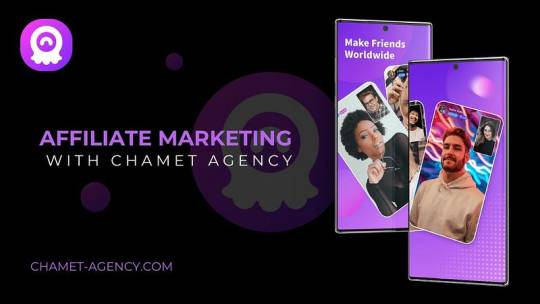
How to Use Affiliate Marketing to Grow Your Chamet Agency
Affiliate marketing is one of the most effective strategies to expand your Chamet agency. By leveraging this powerful digital marketing method, you can recruit more hostesses, attract subagents, and grow your network while maximizing your earnings.
This guide will walk you through how to use affiliate marketing to grow your Chamet agency successfully.
What Is Affiliate Marketing?
Affiliate marketing involves promoting a product or service and earning a commission for every successful referral. For Chamet agents, affiliate marketing focuses on sharing your agency’s unique invitation links to recruit:
Hostesses: Individuals who can earn by live streaming, engaging with viewers, and receiving gifts.
Subagents: People who build their own Chamet agency networks under your mentorship.
By using affiliate marketing tactics, you can efficiently attract recruits, expand your agency, and boost your revenue.
Why Affiliate Marketing Works for Chamet Agents
Affiliate marketing is highly effective for Chamet agents for several reasons:
Cost-Effective: You don’t need a large budget to start; social media and online platforms are often free to use.
Wide Reach: You can target a global audience using platforms like Facebook, Instagram, and TikTok.
Scalability: Once your content or campaigns are set up, they can attract recruits on autopilot.
Measurable Results: Chamet’s invitation links allow you to track your recruitment performance easily.
How to Use Affiliate Marketing for Your Chamet Agency
1. Promote Your Unique Invitation Links
Chamet provides agents with personalized links for recruiting hostesses and subagents. Share these links to direct potential recruits to the registration page. Here’s how:
Post your link on social media bios, posts, and stories.
Share it in email newsletters targeted at potential hostesses and subagents.
Include it in blog articles or YouTube videos about becoming a Chamet hostess or agent.
2. Identify Your Target Audience
Focus on reaching people who are most likely to succeed as hostesses or subagents. These include:
Aspiring Hostesses: Women aged 18–35 who are comfortable on camera and want flexible earning opportunities.
Potential Subagents: Individuals with experience in network marketing, sales, or management who are motivated to build their own teams.
Tailor your messaging to address the specific needs and motivations of each group.
3. Use Social Media to Your Advantage
Social media is one of the best tools for affiliate marketing. Use platforms like Instagram, Facebook, TikTok, and LinkedIn to:
Create Engaging Content: Share success stories, tips for earning on Chamet, and testimonials from your hostesses or subagents.
Use Video Marketing: Videos tend to get higher engagement. Post short clips explaining Chamet’s benefits or showcasing your team’s achievements.
Run Paid Ads: Boost your reach by running targeted ads on platforms like Facebook or Instagram. Use keywords like “earn from live streaming” or “work from home” to attract potential recruits.
4. Create Valuable Content
Position yourself as a trusted expert by sharing helpful content related to Chamet:
Write blog posts about the benefits of becoming a Chamet hostess or agent.
Record YouTube videos explaining how Chamet works and how much people can earn.
Post tutorials on optimizing live streams or earning more on Chamet.
5. Leverage Email Marketing
Email marketing is an excellent way to nurture leads and keep potential recruits engaged. Build an email list and send:
Updates about Chamet opportunities.
Tips for succeeding as a hostess or subagent.
Testimonials and case studies from successful members of your team.
6. Collaborate with Influencers
Partnering with influencers who align with your target audience can help you reach more people. Influencers can:
Share your invitation link with their followers.
Create content about joining your Chamet agency.
Host live Q&A sessions to address potential recruits’ questions.
7. Track Your Performance
Chamet’s tools allow you to monitor the performance of your affiliate marketing campaigns. Use your agent dashboard to track:
The number of recruits who registered using your invitation link.
The activity levels and earnings of your hostesses and subagents.
The overall growth of your agency.
Analyzing these metrics helps you refine your strategies and focus on what works best.
Tips for Success in Affiliate Marketing
1. Be Authentic Authenticity builds trust. Share genuine experiences, testimonials, and results from your Chamet journey to inspire confidence in potential recruits.
2. Highlight Chamet’s Benefits Focus on Chamet’s key selling points, such as:
Unlimited earning potential.
Flexible work schedules.
Daily payouts.
Tools and support for success.
3. Stay Consistent Consistency is key to building momentum. Post regularly, engage with your audience, and keep refining your approach.
4. Use Visuals Eye-catching images and videos attract more attention than plain text. Use high-quality visuals in your content to make it more appealing.
Why Affiliate Marketing Is Essential for Chamet Agents

Ready to grow your Chamet agency? Visit the Chamet Agency Registration Page and start expanding your network today.
3 notes
·
View notes